GROWTH IN IMPACT







In the weeks since officially becoming Dean of Mays Business School, I have loved meeting with current and former students, faculty, staff, employers, and Dean’s Advisory Board members. The common denominator in each meeting has been a shared passion for the success of Mays Business School. Each conversation has left me feeling more optimistic about our bright future at Mays.
While a variety of economic and competitive forces are shaping new challenges and opportunities for business schools nationwide, all of us at Mays are committed to the audacious vision of becoming the preeminent public business school in America. What gives us the confidence that we can achieve such a lofty goal?
The answer is centered in what makes Mays Business School unique from every other business school: the Aggie Spirit and the Aggie Core Values.
Employers who hire our students know that our students are unmatched in their work ethic, their eagerness to learn, and their deep sense of purpose and personal values. Our former students are unrivaled in their commitment to the success of our school and the success of future generations of students at Mays Business School. The faculty here at Mays are best characterized by their passion for excellence in research, teaching, and service. And our staff provide exceptional support to students, faculty, and administrators. Within each of these individuals, the Aggie Spirit motivates a drive for excellence and a commitment to the greater good.
Consider the impact of the Aggie Core Values at Mays Business School. What other business school teaches its students that integrity, respect, and selfless service are keys to achieving success in business? Where else can business students learn that a lifelong commitment to the values of loyalty, leadership, and excellence is the path to greatness? Our Core Values will always differentiate Mays Business School from the competition.
Sixteen years ago this spring, I stepped onto Texas A&M University campus for the first time as part of my search for a faculty position. I sensed immediately that Texas A&M was different than other universities and that the students here were unique. I could feel something special that I later came to understand as the Aggie Spirit. As we work together to achieve preeminence, we will build on the traditions and values given to us by generations of former students at Mays Business School. We are paving the way for future generations of students who expect us to elevate Mays to the pinnacle of excellence. With the Aggie Spirit in our hearts and the Aggie Core Values as our guide, we will develop leaders of character, rise to preeminence, and advance the world’s prosperity together.
Thank you, God bless, and Gig ’em!
Dr. Nate Sharp, Ph.D. Dean of Mays Business School Professor and Nelson D. Durst Endowed Chair Presidential Impact Fellow@MAYS EDITOR-IN-CHIEF
Michelle Blakley, Director, Marketing Communications and Public Relations
MAYS MARKETING COMMUNICATIONS TEAM
Alex Giles, Kiri Stanford, Hiroko Sumikura
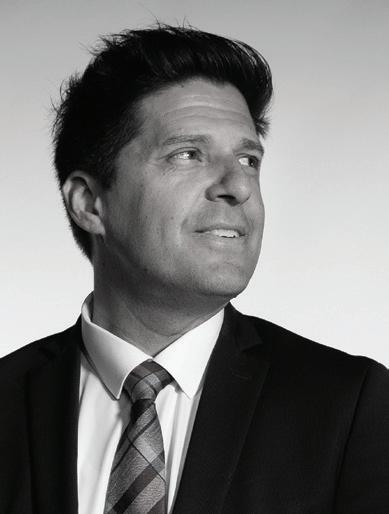
Student Assistants: Venitto Chettiar, Grace Kauderer, August Nennmann, Lauryn Woods
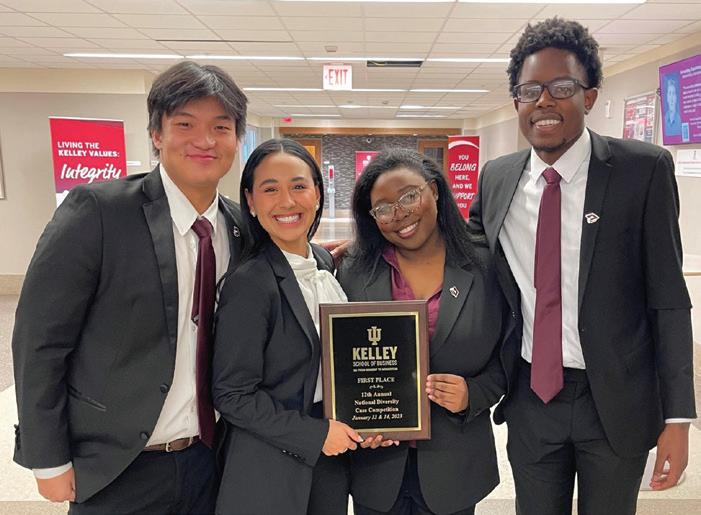
CONTRIBUTING WRITERS/EDITORS AND CONTENT
Alex Giles, Tim Gregg, Chrystal Houston, Dorian Martin, Corey Munoz, Sara Munoz, Blake Parrish, Dr. Nate Sharp, Kiri Stanford, Hiroko Sumikura, Texas A&M University
Division of Marketing & Communications
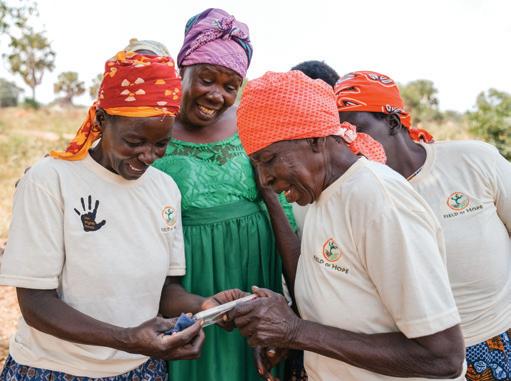
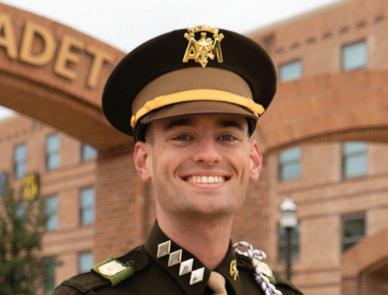

CBS Broadcasting, Inc., Tim Douglass (cover), Alex Giles, Her Mighty Hands, Butch Ireland, Kirksey Architecture, Brenda McShan (Research Communications, design), August Nennmann, Dr. Nate Sharp, Studio Lambert, Hiroko Sumikura, Texas FilmWorks, UScellular

SHARE YOUR FEEDBACK
Please share your feedback with us in your channel of choice using #MaysBusiness or email us at marcomm@mays.tamu.edu


Dr. Nate Y. Sharp has been named dean of the Mays Business School at Texas A&M University, effective February 1, 2023, where he holds the Nelson D. Durst Endowed Chair in Accounting.

Texas A&M President M. Katherine Banks said Sharp is committed to advancing the mission and goals of Texas A&M.
“Nate is known as a unifier and team builder. He not only embraces the Core Values, he also lives them,” she said. “I am absolutely confident he will position the Mays School to be at the pinnacle of excellence where it belongs.”
Wayne Roberts, retired president and CEO of tech company Abrigo, served as a member of the search advisory committee representing the Mays Dean’s Advisory Board.
“The Mays dean search effort was a comprehensive, thorough and exhaustive process spanning nearly nine months. We cast the net far and wide to find the best candidates to lead Mays to become the preeminent public business school in the nation. As a committee, we presented three outstanding finalists with diverse backgrounds, experiences and visions for what Mays could become and we supported the selection of any of them,” said Roberts, who graduated from Texas
A&M in 1985 with a business administration degree before earning an MBA. “President Banks has made a bold and transformational decision by selecting Nate Sharp as our next dean. He is a rising star with high potential and has excelled in every role during his tenure at Mays. Dean Sharp has a compelling vision for what we can become, and I believe he will take us from good to great. He has my enthusiastic support, and I cannot wait to see what we will accomplish under his leadership.”
Sharp reacted to his new role. “It is a tremendous honor to be named dean of Mays Business School,” he said. “I am humbled by the opportunity to serve in this role and, in turn, to give back to a school and a university that have given me so much.
“I sincerely appreciate the support of Chancellor Sharp and President Banks. To have the confidence of these two visionary leaders means a great deal to me, and I am thrilled to work together with them and with the incredible faculty, staff and students of Mays Business School to achieve our goal of preeminence.”
Sharp’s areas of research expertise include corporate financial reporting, financial analysis, financial journalism and financial misconduct. His research is published in leading scholarly journals and has received multiple best-paper awards, including the 2021 Distinguished Contributions to the Accounting Literature Award from the American Accounting Association.
He received bachelor’s (cum laude) and master’s degrees in accounting from Brigham Young University’s Marriott School of Business and a Ph.D. from the University of Texas at Austin’s McCombs School of Business.
His research has been discussed extensively in financial media, including in stories published in The Wall Street Journal, Financial Times, CNBC and the Harvard Law School Forum on Corporate Governance and Financial Regulation. He was named a Texas A&M University Presidential Impact Fellow in 2018 and became department head in 2020. He previously served from 20162020 as Ph.D. program coordinator in the James Benjamin Department of Accounting.
Sharp is an award-winning teacher who has taught classes to undergraduate and graduate students at Texas A&M. He was the recipient of the 2018 David and Denise Baggett Teaching Award, the 2015 Association of Former Students Distinguished Teaching Award, the 2012 Ernst & Young Teaching Excellence Award and a 2010 Texas A&M University System Teaching Excellence Award. He was recognized as the 2012-13 Texas A&M University Center for Teaching Excellence Montague Scholar in the Mays Business School and a 2009 Texas A&M University Fish Camp Namesake.
Sharp and his wife, Holly, are the proud parents of five children.

The Office of Diversity and Inclusion sponsored and coached a group of students in the National Diversity Case Competition at the Indiana University Kelley School of Business. The team from Mays competed against 32 other teams from across the country and won first place!

Congratulations to Emori Reece ’23, Mattison Gonzales ’26, Filbert Presley ’26 and Akorede Ademola ’26 on their success!”
Students in Texas A&M’s Master of Science in Human Resource Management program took first place in the 2022 Purdue HR Case Competition hosted on Purdue’s campus in West Lafayette, Indiana.
Students Abbey Dethloff ’22, Joanna Moran ’22, Abby Patterson ’22, and Bailey Wilkins ’22 worked in advance of the competition to present a potential solution for PepsiCo’s desire to attract and retain more females in front-line roles at several sites in their NorthCentral region.

Congratulations to Emily Shafron, Christopher Yust, and their co-authors for their paper, “‘No Comment’: Language Barriers and the IASB’s Comment Letter Process,” receiving the Best Paper Award for the 2023 The Public Interest Section (PI) of the American Accounting Association International midyear meeting! This is awarded annually to the paper that best addresses and provides guidance for important public interest questions at each of the AAA’s midyear meetings. With this paper, they are the first to examine the effect of language barriers on formal participation in the standard-setting process.
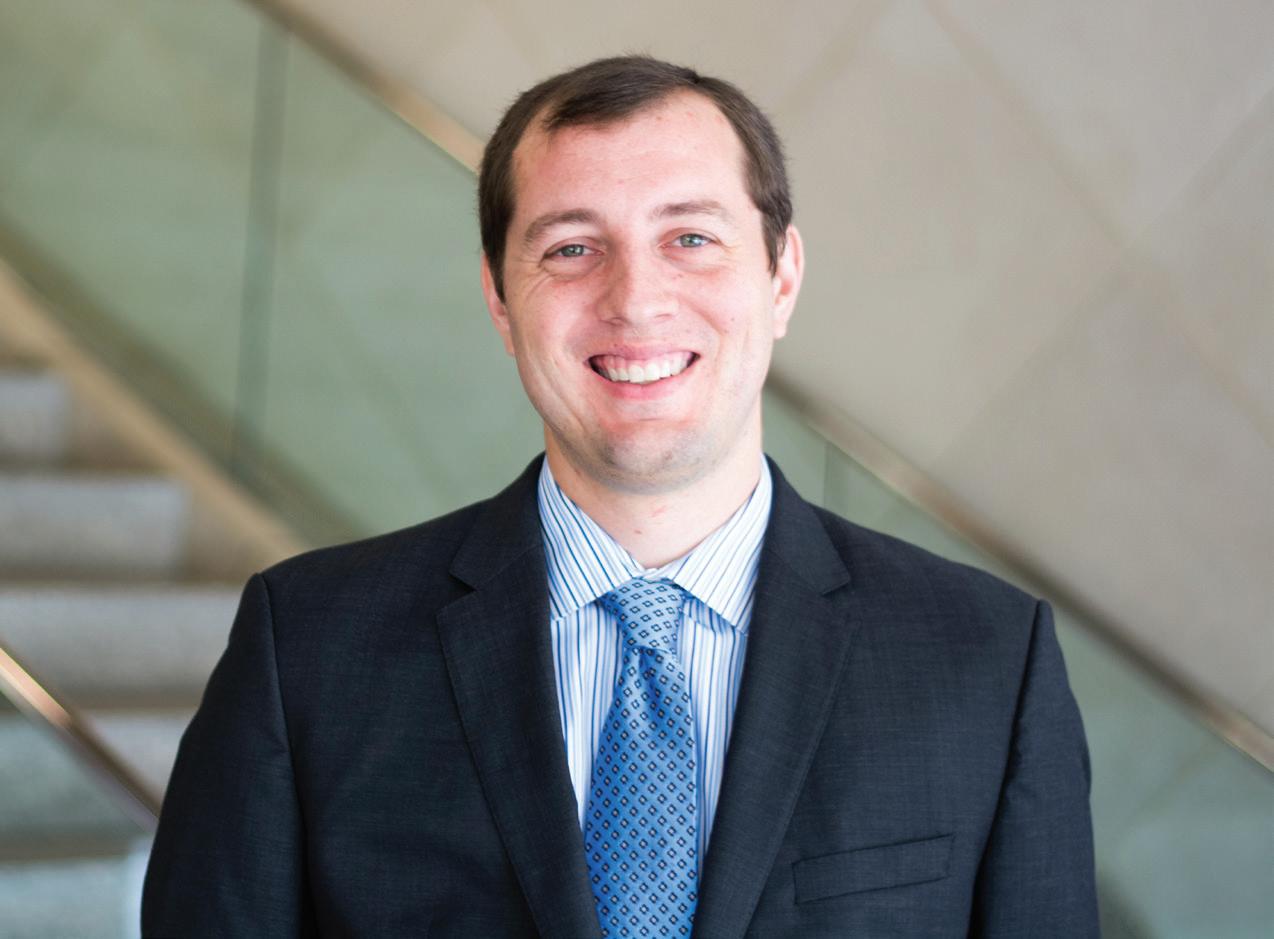
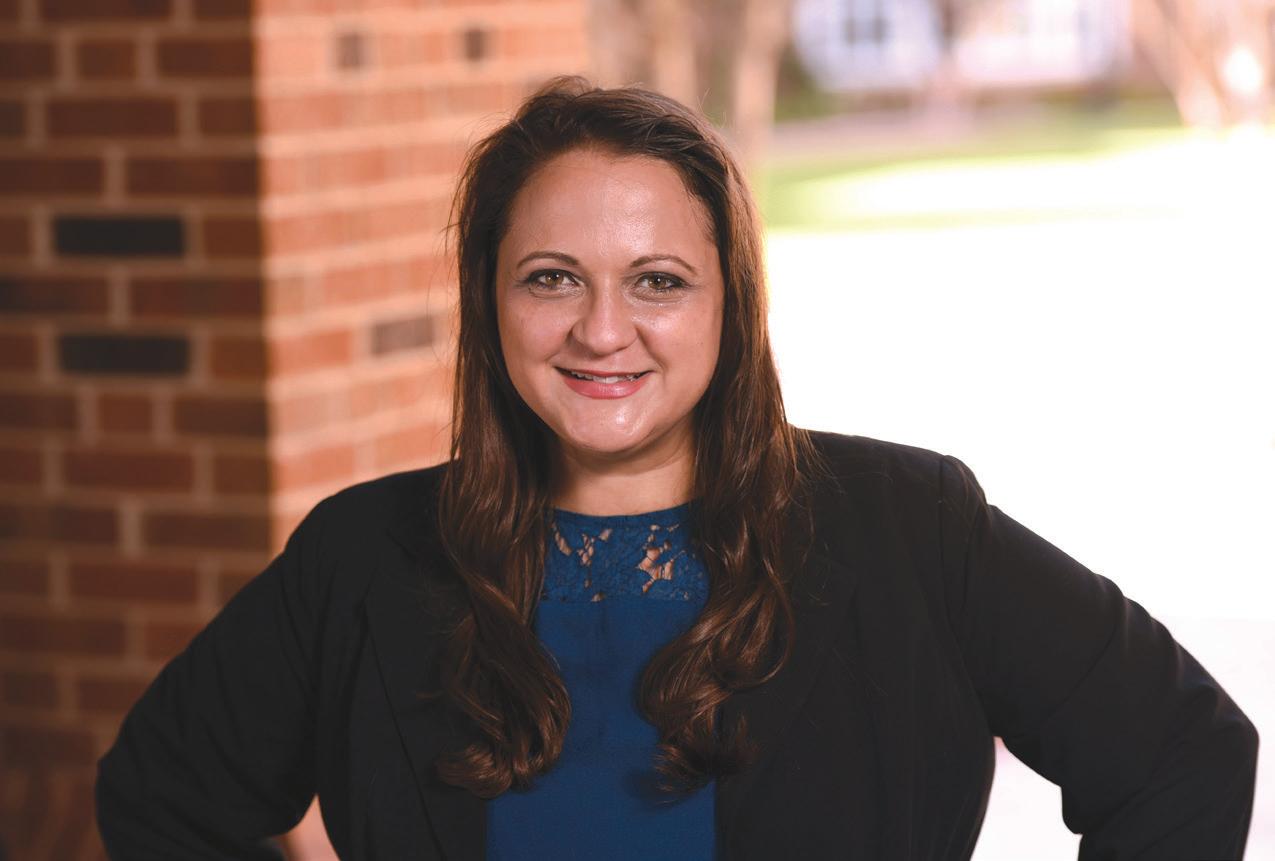
 Dr. Matthew Call
Assistant Professor of Management
Photo by August Nennmann ‘23
Dr. Matthew Call
Assistant Professor of Management
Photo by August Nennmann ‘23
Dr. Matthew Call joined a growing list of faculty members from Texas A&M University’s Mays Business School who are featured in the Wall Street Journal (WSJ), the world’s preeminent business publication with a circulation of almost 3 million subscribers. Call authored a column entitled “How Companies Can Turn Former Employees into Faithful Alumni,” which was published Sept. 23, 2022.
The publication of Call’s column in the prestigious industry publication adds to Mays’ already sterling reputation.

The school has 11 faculty members who rank in the top 2% of scholars worldwide. Additionally, Mays is among the Top 20 public business schools in the United States.
Call was recommended to the WSJ by Dr. Anthony Klotz, a former Mays faculty member who contributes similar columns for the publication. After discussing his research with a WSJ editor, Call was invited to author the column on alumni networks.
The development of alumni networks helps companies engage with a mobile workforce that no longer remains with a company for most of their career. Call believes that part of the reason for this mobility may be because employee loyalty has not been reciprocated by companies over the years. “There’s this reshaping of the employer-employee relationship over the past 20-30 years that has led companies to realize that people are not seeing their jobs
as a lifelong relationship now,” Call explained. “They’re leaving–and in the past, companies just thought the employees were gone for good.”
Some companies purposefully have a model that doesn’t encourage employee retention and tenure. For example, some firms like Goldman Sachs hire young elite professionals, knowing they will work for the company for a short period of time. “There’s actually research that shows that people are willing to take a pay cut to start at a high-status firm because of what it does for their resume going forward,” Call said. “All of this is wrapped in the idea that once you have this experience, you take that with you.”
However, Call sees companies increasingly trying to capitalize on employee mobility by creating relationships with employees after they leave the firm. “Having goodwill from employees leads to a host of benefits,” he said. “As a company, we can draw upon that identity that you take with you, so you can continue to refer to us, come back and work for us, or be a resource in general.”
Many employees go on to work for the company’s client firms, so maintaining an alumni relationship can be very beneficial. “A lot of these initial companies start to develop these alumni networks to formalize the relationship and to stay in touch with former employees
“A lot of these initial companies start to develop these alumni networks to formalize the relationship and to stay in touch with former employees as a competitive advantage.”
– Matthew Call
as a competitive advantage,” he said. “When companies have alums working in their client firms, they will get first dibs (on projects) and can (further) develop that relationship.”
Additionally, companies can benefit by staying in touch because some former employees may return in the future. “In many industries, boomerang employees are up to 10-20% of new hires,” Call said.
Alumni networks also can help influence prospective employees through Glassdoor and social media. “If ex-employees are saying it was a great experience, prospective employees are more likely to go to that place,” Call said. “Leaders are seeing that this branding is important, and alumni have a big place in that.”
However, the Mays assistant professor also noted that valid concerns exist related to companies celebrating employees leaving. “There is some hesitation around it because there are these perceived and actual costs associated with high-fiving people on the way out,” he said, pointing out that this approach may set the stage culturally for very higher turnover and the associated costs of finding and onboarding new talent.
Additionally, some employees who leave may be opportunistic and use the company’s alumni network to gain knowledge of best practices without reciprocating in the knowledge sharing. “When they are not a formal employee, you don’t have monitoring systems in place to say, ‘You’re not allowed to act opportunistically,’” Call explained.
Despite these potential downsides, the management professor believes that companies will continue to turn to corporate alumni networks. “I think with the current job market, these alumni networks will be increasingly happening,” he said. “It’s important to help managers understand that these employees still have value as a human and still can add value as alumni, so we need to attenuate managers’ sense of betrayal. It’s about being part of an extended family.”

Similarly, Call’s burgeoning relationship with the WSJ continues to build an important network that supports Mays’ momentum to become the nation’s public preeminent business school. The publication previously tapped Mays’ expertise from Dr. Leonard Barry and Dr. Mike Shaub— and WSJ editors have commissioned Call to write another column about high-performing star employees’ impact on their peers, which is expected to be published in November.
These types of opportunities support Mays’ efforts to become the nation’s preeminent public business school. “It helps by both getting our name in front of larger audiences and by demonstrating the expertise that resides in our faculty,” Mays Former Interim Dean Ricky Griffin said. “We’re fortunate to have outstanding faculty members like Dr. Call who are doing translational research that provides relevant insights to help business leaders strategically position their companies for success.”
“Leaders are seeing that this branding is important, and alumni have a big place in that.”
Texas A&M University’s Mays Business School is advancing International Business research around the world through co-hosting the Research Spotlight Series (RSS). These events, which are coordinated through Mays’ Center for International Business Studies (CIBS) and Michigan State University Eli Broad College of Business’ Center for International Business Education and Research (CIBER), bring together current and aspiring International Business scholars in an online forum to create a discussion on cutting-edge topics regarding research and publishing.
Mays CIBS’ role in organizing the series increases Texas A&M University’s global visibility and helps solidify Mays as a global leader in the field of International Business scholarship. Hosting this series also is part of the school’s efforts to become the preeminent public business school in the United States.
The RSS builds upon Texas A&M’s long history as a leader in the study of International Business. “Texas A&M University’s Lorraine Eden served as editor-in-chief of the Journal of International Business, which is the premier journal in International
 David A. Griffith
Photo by August Nennmann ‘23
David A. Griffith
Photo by August Nennmann ‘23
We saw the need as well as the opportunity before us—and we both concluded that leveraging webinar technology to advance International Business research would complement the activities of our CIBERs.”
Business and a publication of the Academy of International Business (AIB). She is currently the Dean of the Fellows of the AIB, a select group of distinguished International Business scholars,” said Mays CIBS Associate Director of Research Dr. David A. Griffith. “Texas A&M’s faculty–both past and present and within Mays and outside of Mays–have made significant contributors to the International Business discipline.”
The RSS, which began in 2021, was a result of a confluence of factors. “The COVID pandemic opened the whole domain of webinars, allowing scholars to begin to connect pertaining to common interests without the need for travel,” said Griffith, who holds Mays’ Hallie Vanderhider Chair in Business. “In 2020, Ahmet Kirca became the director of the Michigan State University’s CIBER, which really opened the door for us to establish this joint effort. We saw the need as well as the opportunity before us— and we both concluded that leveraging webinar technology to advance International Business research would complement the activities of our CIBERs.”
The RSS addresses leading-edge International Business topics in areas such as exporting, global sales management and global supply chain management, as well as research methods, such as survey research and the measurement
of cultural distance in international business research. These sessions are attended by both well-established scholars as well as nextgeneration researchers.
The virtual seminars already have a strong international following. For example, a September 2022 webinar on global supply chain management had registrants from Brazil, Canada, China, Chile, France, India, Ireland, Japan, Kenya, Kuwait, Lithuania, Malaysia, Mexico, the United Kingdom, the United States, and Turkey.
The most recent webinar, held in November 2022, focused specifically on research publication, and built on a previous RSS webinar, which featured journal editors from Management International Review, the Journal of World Business, and the Journal of International Marketing.
The November webinar hosted four editors who are part of the incoming editorial team for the Journal of International Business Studies (JIBS), the premier journal in the field of International Business. Each panelist offered insights about the decision-making process in selecting manuscripts to publish in their respective JIB area. The session also gave over 250 participants the opportunity to ask questions about JIBS’ processes.
kycstudio/iStock
The virtual seminars already have a strong international following. For example, a September 2022 webinar on global supply chain management had registrants from Brazil, Canada, China, Chile, France, India, Ireland, Japan, Kenya, Kuwait, Lithuania, Malaysia, Mexico, the United Kingdom, the United States, and Turkey.

Griffith believes the RSS webinars can assist International Business scholars in developing more impactful IB research. The Mays professor of marketing noted, “Through participation in the webinars, participants are able to hear from leading scholars about emerging research topics and stateof-the-art methods – which can be invaluable for developing their own scholarship.”
The next webinar in the series will focus on best practices for the use of meta-analysis in international business research. Meta-analysis is a research method for statistically combining the results of multiple scientific studies. Meta-analytic findings are considered the most trustworthy source of evidence in the scientific discipline.
INTERESTED IN LEARNING FROM THESE LEADING GLOBAL RESEARCHERS ABOUT INTERNATIONAL BUSINESS TOPICS? ACCESS PREVIOUS WEBINARS HERE
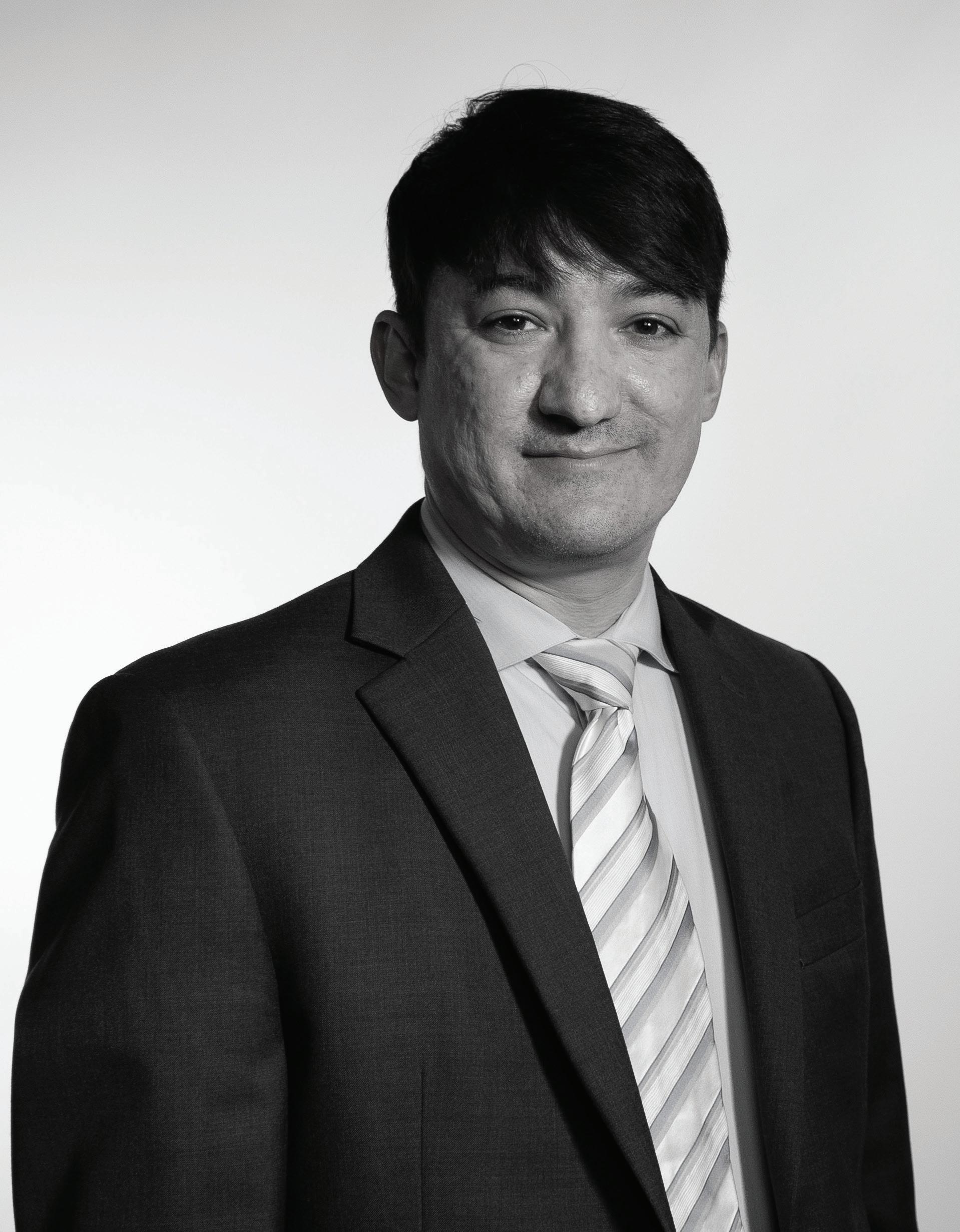
Michael Withers calls his undergraduate years as a business-school student in Mississippi “interesting.”
To say the least.
During his first week of classes at Mississippi State University in Starkville, the United States was attacked by terrorists who took command of passenger jets on the morning of September 11, 2001, and flew them into New York City’s World Trade Center and the Pentagon building in Washington, DC, killing almost 3,000 people.
Less than three months later, on December 2, 2001, the Enron Corporation, an energy giant based in Houston, Texas, filed for Chapter 11 bankruptcy protection in a New York court, sparking one of the largest corporate scandals in U.S. history…to that time. By the summer of 2002 though, a company headquartered in Clinton, Mississippi, called WorldCom, would take
corporate malfeasance and the overstating of corporate assets to even greater levels of accounting fraud and executive greed.
“And don’t forget the ‘dot-com’ bubble,” Withers reminds from his office today at the Texas A&M University Mays Business School, where he holds the Gina and Anthony Bahr (’91) Professor in Business chair; teaches in the Department of Management and conducts research in the fields of corporate governance, resource dependence theory and entrepreneurship. That bubble, beginning in the late 1990s, hinged on excessive speculation of Internet-related companies. By the time the bubble burst in the fall of 2002, the NASDAQ-100 had lost almost 78 percent of its value from the peak of the dot-com craze.
By the time Withers completed his undergraduate degree in business administration with an emphasis in management, the business world, perhaps more than ever, was no longer for the faint at heart. But Mike was committed, in part

because a textbook in his Strategic Management class had “spoken” to him; a textbook with ties to the Texas A&M Mays Business School.
The Mays name, it turned out, would come up a lot during his pursuit of an academic career.
Michael Withers was born in Philadelphia, Mississippi, and the year he came into the world there, 1981, was the same year that a young Philadelphia high school athlete was taking the college football world by storm. It turns out the story of Marcus Dupree is relevant to the business research Withers has conducted throughout his academic career because the courtship of an uncommonly talented high school football player reveals how greed can adversely influence the decisions made by those who have achieved success and desire more.
While wrapping up his senior year at Philadelphia High School, Dupree waded through hundreds of scholarship offers before announcing his commitment to play football for the University of Texas. Ultimately, he attended the University of Oklahoma, and that change of heart was cause for much speculation. Dupree played at Oklahoma for a year and a half before leaving school and eventually signing, in 1984, a multi-million dollar professional contract to play for the New Orleans Breakers of the original United States Football League. His career there was cut short by injury, and his earnings were depleted by shady characters who took advantage of him.
No less a source than the Harvard Business Review calls the 1980s the “Decade of Greed.” Who can forget the immortal words written by Oliver Stone and spoken by Michael Douglas in the 1987 film, Wall Street.
“The point is, ladies and gentleman, that greed, for lack of a better word, is good. Greed is right, greed works. Greed clarifies, cuts through, and captures the essence of the evolutionary spirit. Greed, in all of its forms; greed for life, for money, for love, knowledge has marked the upward surge of mankind.”
“I think some of the corporate scandals of the early 2000s were tied to that ‘Wall Street’ mentality of greed being an acceptable business practice,” Withers says.
“That sort of thinking did pique my interest and probably set the stage for when I started to hone my research interests.”
According to a Securities Exchange Commission (SEC) investigation, the WorldCom scandal, “was accomplished in a relatively mundane way: more than $9 billion in false or unsupported accounting entries were made in WorldCom’s financial systems in order to achieve desired reported financial results… Most of WorldCom’s people did not know it was occurring. Rather, the fraud occurred as a result of…the way WorldCom’s Chief Executive Officer, Bernard J. Ebbers, ran the Company.”
Culpability in the Enron case was revealed to be far more broad in scope. According to the findings of the Permanent Subcommittee on Investigations of the Committee on Governmental Affairs of the United States Senate, a sizable portion of the blame rested with the Enron Board of Directors, who:
“…failed to safeguard Enron shareholders and contributed to the collapse of the seventh largest public company in the United States, by allowing Enron to engage in high-risk accounting, inappropriate conflict of interest transactions, extensive undisclosed off-thebooks activities, and excessive executive compensation. The Board witnessed numerous indications of questionable practices by Enron
management over several years, but chose to ignore them to the detriment of Enron shareholders, employees and business associates.”
“Companies like Enron and WorldCom make terrible decisions often times simply because of hubris,” Withers says, “whether it got them into the situation or they just thought they could beat the system.
“It’s kind of interesting when you’re the CEO of a public company. How do you measure yourself? In a lot of ways, it’s how big that dollar sign is, and there’s a competitive drive that inherently fuels the hubris. The Enron documentary was called The Smartest Guys in the Room, and I think we still see that mindset as an issue in strategic decisionmaking today.”
Two decades have passed since the Enron and WorldCom scandals–and others like them–rocked the American landscape. As for Withers’ own academic journey, he graduated from Mississippi State–having previously attended a community college–in 2002, then received his MBA from Southern Mississippi University in 2004. From there, he pursued an MA in Management from the University of Alabama, receiving that degree in 2005, then began work on a PhD in Strategic Management at the Tuscaloosa school.
Coincidentally, the Alabama football program during Withers’ time on campus was serving an NCAA-
mandated three-year probationary period for recruiting violations.
Ultimately, Withers left Alabama, not because of sanctions to the football program, but upon the advice from someone there with ties to Texas A&M.
“Micki Kacmar, was a professor in the Department of Management who had earned her Ph.D. in Human Resource Management from Texas A&M,” Withers says. “While she was at Alabama, she taught graduate courses in Business Ethics. She knew me and knew how hard I was working in pursuit of my own PhD, but my studies weren’t aligned with my interests. She reached out to several schools on my behalf, and one of those calls was to Bert Cannella, a professor at Arizona State whom she knew as a result of his time on the faculty at Texas A&M.
Thanks to the Kacmar-Cannella connection, Withers transferred to Arizona State, where he met and worked with another product of Mays Business School Ph.D. program. Amy Hillman would eventually serve as dean of the Carey School of Business at Arizona State, but as a professor there when Withers arrived, her academic interests–corporate political strategies, boards of directors and corporate strategy–closely aligned with Withers’. Thus, Hillman agreed to become his academic advisor.
“She was an important mentor,” Withers says today of Hillman, who was named an Outstanding Doctoral Alumni of the Texas A&M Mays Business School in 2008. It was in large part thanks to her recommendation, that when the time came for Withers to begin his search for a teaching and research home, he reached out to Mays Business School.
“From that textbook we used at Mississippi State”–called Strategic Management: Competitiveness and Globalization–“through the twists and turns that led me to Arizona State,
from January 2021 to the end of July 2022. Both Ireland and Hitt have received Lifetime Achievement Awards from Texas A&M, thus the posters outside Withers’ office. On the opposite end of their academic careers, both received their undergraduate and MBAs from Texas Tech University.
About that textbook, Withers explains, “Two of the authors of that book, Michael Hitt and Robert Hoskisson, were members of the Texas A&M business faculty when it was first published in 1995. Their co-author, Duane Ireland was at Baylor at the time, but ultimately wound up at Mays Business School in 2004.”
In fact, framed posters honoring Hitt and Ireland hang in the hallway outside Withers’ office in Mays’ Department of Management. Mere coincidence, as it turns out, but still inspiring to Withers, “Their work here is revered by many, including myself,” he says.
Hitt is a Texas A&M University Distinguished Professor Emeritus. He first joined the Mays Business School faculty in 1985 and has held a variety of chairs, including New Ventures, Entrepreneurship and Executive Leadership.
Ireland currently holds the Benton Cocanougher Chair in Business at Mays. He served as both acting and interim dean of the school
In addition to their textbook–now in its 14th edition, and one Withers still uses in the classroom–Hitt and Ireland have collaborated on more than one hundred journal articles, including, “Where is the Opportunity without the Customer? An Integration of Marketing Activities, the Entrepreneurship Process, and Institutional Theory,” “Resource Orchestration to Create Competitive Advantage: Breadth, Depth and Life Cycle Effects” and “Strategic Entrepreneurship: Creating Value for Individuals, Organizations and Society,”
No doubt, says Withers, Hitt and Ireland led by example in the important research they conducted, but they also helped establish formal mentoring relationships with younger faculty.
“Mike and Duane were always there for me to talk with about research ideas,” Withers says today, “Luckily, I’ve been able to work with each of them to publish papers. They’re both so humble and were always focused on just doing good scholarship, great research and being of service to the department, to the college, to the university and to the academy,”
The Academy of Management is, according to its website, “the preeminent professional association for management and organization scholars. (Its) members are professors and Ph.D. students in business schools at universities, academics in related social science and other fields, and practitioners who value knowledge creation and application.”
Texas A&M seemed to always be in the background of my academic journey, even before I got here to teach in 2011 as a visiting assistant professor.”
One of Wither’s first publication credits on the subject of corporate governance came under the tutelage of Robert Hoskisson after he had moved from Texas A&M to Arizona State.
“Bob had gotten involved in a debate in a journal called Academy Management Perspective,” Withers says. “We were looking at the question of why CEO compensation was on the rise. This was in the aftermath of the major corporate accounting scandals in the early 2000s and the subsequent passage of the Sarbanes-Oxley Act. At the time, Bob was revising his chapter on corporate governance in the Competitiveness and Globalization book to account for the changes in business practices ‘SOX’ brought about.
“SOX” is a less cumbersome to write and pronounce shorthand for the Sarbanes-Oxley Act.
“What we concluded then was CEOs might be paid more because they were facing greater employment risk, meaning their job is not as secure when a board is independent and objective, Our publication was a conceptual piece, meaning we didn’t have any data that we were analyzing.”
Of the more than two dozen papers Withers has published thus far in his academic career, most of his research
employs the “deductive hypothesis method,” That means a researcher formulates a set of hypotheses at the start of the research. Then, after relevant research methods are chosen, those are applied to test the hypotheses to prove them either right or wrong.
In the case of Withers’ chosen field, strategic management, researchers seek to measure the consequences of human behavior. Thus, psychology, sociology and economics are critical elements of the methodology.
“Those are the ‘big three,’” Withers says, “which provide the foundation for a lot of what we study. We are interested in how people interact and why they make the decisions they do. In my own research, particularly on corporate governance, the hypotheses often come down to questions of why are executives making the decisions they’re making? Why do boards implement certain governance practices?
“Often it does come down to a very socialized view of the organizational context you’re focused on.”
One of Withers’ most recent research collaborations resulted in the publication of a paper entitled, “Corporate directors’ implicit theories of the roles and duties of boards,” in the Strategic Management Journal. Withers co-authored the piece with another member of Mays Business School, Steven Boivie, along with Scott Graffin from the University of Georgia, and Kevin Corley from Arizona State.
In their abstract summary, the authors stated:
“The question of what boards do, or should do, has remained a central focus in governance research. Much of this research is based on explicit theories or empirical models that impose assumed behaviors onto boards—such as monitoring— that are thought to define their roles and
duties. While these explicit perspectives have offered critical insights, we suggest it is time to consider directors’ implicit beliefs of their roles and duties to understand their perspective of the board’s overall role.”
The results of those interviews led to some unexpected conclusions, according to the Strategic Management Society’s Explorer website and a story which appeared there about the journal publication.
“After interviewing 50 current directors and executives of publicly traded US companies, the authors found that how researchers conceptualize directors does not match with how directors themselves view their duties.”
Or, to put it in the terms of the deductive scientific method, the original hypotheses on which much previous corporate governance research studies had been based were flawed.
“Steve, Scott and I are all corporate governance researchers,” Withers says. “Early in the process of devising our methodology for the study, we realized the value of a qualitative approach. I had worked with Kevin before on some governance related work, but he’s mostly a qualitative researcher. Thanks to his expertise we were able to go beyond merely relying on secondary data. Rather, we reached out and talked to individuals directly to get a better idea of how they perceive the roles they play.’”
The Sarbanes-Oxley Act of 2002–also known as the Public Company Accounting Reform and Investor Protection Act–was the most notable piece of legislation enacted following the corporate accounting scandals of the early 2000s The law covers a range of issues from enhanced financial discloser and auditor independence, to internal control assessment and corporate governance. Specifically, the act increased the oversight role of boards of directors.
Years later, former Federal Reserve Chairman Alan Greenspan praised SOX, saying, “The act importantly reinforced the principle that shareholders own our corporations and that corporate managers should be working on behalf of shareholders to allocate business resources to their optimum use.”
Yet, as the Boivie, Withers, Graffin, and Corley study reveals twenty years later, directors’ implicit views of their corporate governance responsibilities have shifted significantly away from the SOX mandate.
“One primary insight we gained is that directors do not operate from the assumption that their job is to protect against managerial opportunism. Instead, directors tend to possess an implicit view that their role is as strategic partners with the CEO and executive team.”
“It was kind of exciting,” Withers says of the means by which that information was gathered. “Initially, we were asking questions related to the idea that most of the work of a board happens in committees. The directors we talked with told us that does happen and is important. But, if there’s a strategic decision that’s being made, it’s going to involve the entire board.”
That knowledge altered the collaborators’ research focus.
Participants in the study–which commenced in 2017–came from across the country Many of the directors tabbed for the study, which began in 2017 and was published in 2021, were identified through Mays Business School’s Center for Executive Development. Of that number, several were located in the Houston area and the majority of those interviews were conducted in person.
The qualitative methodology was somewhat new for Withers.
The experience has caused him to rethink the manner in which research can be conducted.
“I think there are some benefits to the traditional approach.” Withers says.
“but when you engage with executives and really talk with them about a topic, you get what we call ‘face validity.’
“The nature of explicit theory is that when you see something you say, ‘Well, that makes sense on the face of it.’ But when you talk with these directors and get insights from them that we had never really seen in our literature, it was an amazing thing. For me, the research questions that came out of that provided a wellspring of new ideas.”
In the aftermath of the “implicit theories” study, Withers has begun teaching courses within the Mays Business School’s Executive MBA program, providing him with more “face validity.”
“The wonderful thing about the Executive MBA students is that much of the reason why they’re here is to have conversations with one another. Facilitating that is very beneficial to me, as well. It’s stimulating to hear examples of business-case scenarios that aren’t coming from a textbook, but rather from someone’s real life experience. That re-energized my desire to read those kinds of business books again.”
Withers says between 40 and 50 percent of his Executive MBA candidates come from the oil and gas industry. Most who enroll are looking to move up within their companies or pivot to other opportunities. The
topics of interest to people who are “on the move” is providing Withers with a “new way to look at things” research-wise.
As for today’s world where the financial ravages of a long-lasting global pandemic have created a fragile global economy, does Withers see a possible return to the “greedis-good” mindset of days gone by? He does predict an imminent decline in executive compensation, and that could lead to a need, he says, for a return to more stringent corporate governance guidelines.
The world of big-time college football recruiting today has been inexorably changed. No longer must zealous coaches make under-the-table deals to the most highly-coveted players. Today, remuneration for use of a player’s “Name, Image, or Likeness” is above board, and players can seek the best deals possible, even if it means transferring to another school.
Will the corporate world follow suit?
“Greed” is now an acceptable and encouraged practice in building and maintaining elite programs.
“Business executives may feel the temptation to try to tip the scales again in order for their organizations to make it through the tough times,”
Withers suggests. “Just recently, inflation has hit a 40-year high, which takes us back to the early ’80s and our nation’s worst recession since the Great Depression. That recovery justified, for many, the greed mentality which set the stage for the prosperity of the ’90s and the corruption of the 2000s.”
“Certainly it’s a unique time to be a CEO,” Withers says, “Executives today are being challenged to make decisions to ensure that their companies survive long enough for an eventual return to prosperity. It’s the job of governing boards to make sure that return to prosperity does not jeopardize the investment of stakeholders.”
Rest assured, academic researchers like Texas A&M University associate professor Michael Withers will be keeping a close eye on future trends.
Texas A&M’s Mays Business School is setting the bar for student leadership.
Mays Business School is in the business of leadership, and never has that been more evident. This year, the Aggies at the helm of the three largest student-run organizations –for the nation’s largest student body– are Mays’ proteges.
Mays standouts: CASE HARRIS, NEHA DESHMUKH, and GRAYSON WINCHESTER lead the Texas A&M Student Government, the Memorial Student Center, and the storied Corp of Cadets – respectively. A common trait linking their exceptionalism is selfless leadership – an others-first focus uncommon among achievers of their caliber. Their efficacy is underscored by humility and consensus building; their shared experience? The Mays Business Honors Program. Business Honors advisors coach students to find their point of greatest contribution. And that’s the question we see each of these seniors answering. Deliberate and reflective, they start by asking:
• What kind of legacy do I want to create?
• How can I take that into the places I’m engaged on campus and beyond?
Each of these three has cut a distinguished path to the top of their organizations, but all began their collegiate careers as part of the same Mays family. Commandant of the Texas A&M Corp of Cadets, Brigadier General Patrick Michaelis spoke to the synergy this creates, “having three key leaders in one class builds energy across campus that measures itself in unity of effort.” And big things are happening on campus under the direction of this trio.
In the subsequent pages we will explore what motivates them, how Mays has helped to shape their development and what leadership looks like from each of their unique perspectives. Join us in celebrating these extraordinary student leaders by reading and sharing their stories.
Texas A&M Student Body President, Case Harris leads by example. Humble and dedicated, visionary and action oriented, Harris is big on ideas but also quick to mobilize his team to bring vision to reality. A senior, Finance and Business Honors Major from Austin, Texas, Harris is hands on and hardworking –leading the nation’s largest student body with poise and perspective beyond his years. As we connected with Harris and his advisors, a pattern emerged of humble service, building into the future by giving back, and getting big things done. Case Harris is the face of Texas A&M and the model Mays student.

Arguably the busiest student on campus with the rigors of an honors curriculum and the tremendous responsibilities that accompany heading up a student government representative of more than 72,000 students, Harris approaches every conversation with his undivided attention. Despite remarkable achievement, he retains his humble demeanor. Harris credits his peers, his parents, his Aggie community, and Mays Business School with equipping him to lead. “One of the things that makes Case so special is his consistency and humility,” shared Mays
In the Spring of his freshman year, Harris was tapped to participate as a mentor in the Mays Business Honors peer leadership program, and he immediately stood out.
Business Honors Program Manager Jeffrey Glenn. “He’s matured and grown over four years, but remains the exact same person – true to himself, without ego.” Mentors across campus share the same sentiment. Texas A&M Chief Operating Officer Greg Hartman affirms that Harris’ humility is essential to his leadership but doesn’t stand in the way of progress. “Case is humble enough to know he has a lot to learn, but not afraid to make decisions and mistakes.”
Harris’ penchant for leadership took shape early in his collegiate career. Quickly stepping into leadership incubators like Texas A&M’s Fish Aides program, he identified aspirations to serve the student body on a broader scale, with an inkling that one day he might want to pursue student body president. “Listening to student leaders talk about how we, the students, can be heard and how we can advance the university, I thought to myself – I want to serve in this capacity one day.”
In the Spring of his freshman year, Harris was tapped to participate as a mentor in the Mays Business Honors peer leadership program, and he immediately stood out. At an offsite for peer mentors, Harris’ contributions set him apart. “I was struck by how well formed and others focused his thoughts were,” shared Glenn. “He stood out from the jump as visionary, articulate and thoughtful.” Harris is deliberate about listening, and applying what he learns to activate solutions to problems. The year he served as peer mentor began in the fall of 2020, as the Covid-19 pandemic continued to dictate the campus experience. Harris’ concern for the incoming freshman was notable and as always, he found a path
to action. Director of Mays Business Honors Program, Kristine Morley worked with Harris in this period and noted the relentlessness with which he pursued improving the students’ mid-pandemic transition to campus. “Case was determined to find ways for the students to get to engage and connect with their peers, respectful of and working within the limitations of social distancing,” she said. “He had to jump through every safety hoop – and he made it happen. He’s an activator and the students were so appreciative.” As his leadership on campus and among his peers evolved, Harris felt a calling to run for the top seat in the student body.
Asked about how Mays has helped to shape his leadership trajectory, Harris doesn’t bluster. “Mays is obviously excellent academically but really shines in the way it prepares students for leadership and life beyond the classroom,” he states. “I’ve learned so much from the diversity of faculty – from illustrious tenured academics, to professors steeped in industry experience – and from our group projects and class discussions, to professional development and hands-on advisors. The soft skills that Mays equips us with are unmatched.” Practically speaking, Harris credits Mays with pushing him to think more analytically and exercise greater attention to detail. Harris had particular praise for the Business Honors and peer leadership programs. “Peer mentorship is critical for student development and it’s an environment that cultivates leaders.” He expounds “Upperclassmen pour into the next generation of Mays students and it helps to keep the culture of excellence,
service and self improvement consistent.” Harris interned in the finance sector and had opportunities to put his holistic Mays education to work, in addition to his tireless work on campus. He looks forward to applying his learnings in industry upon graduation. “Mays is helping to prepare us to be transformational leaders, not just on the broader Texas A&M campus, but as we step out of this space to build careers and a legacy.”
Harris’ faculty for language and organizational management belies his age. Leadership outside of the college of business recognizes the difference. Addressing the impact of Mays on Harris’ leadership, Hartman – whose extensive background in the private sector exceeds his time in academia – cut to the chase. “If I were starting any business from scratch, Case would be my first hire,” he shared. “He’s clever and articulate, with great instincts – thinks strategically and absorbs wisdom like a sponge.” Case is devoted to service,” states Glenn. “He wants to ensure every student has a successful and positive experience at Texas A&M.” That’s reflected in the priorities he’s laid out for campus life as Student Body President.
Harris’ fixation on unity is commendable. With a unifying rallying cry centered on tradition, involvement and advocacy –he’s seeking to prove that for Aggies (and beyond), that which unites us is greater than that which divides us. He summarized his positioning and priorities
• Unity through traditions: Traditions give us all something to rally around and a chance to be a part of something
bigger than ourselves. Let’s unite the student body by enhancing buy-in and accessibility to our traditions.
• Connect Aggies to involvement: Every Aggie deserves to take advantage of the vast number of resources at Texas A&M. Let’s increase clarity and bridge gaps in involvement opportunities.
• Advocate for the support Aggies need: Every Aggie should be set up for success. Let’s work to increase awareness and resources for mental health, increase sexual assault prevention measures, grow the Open Education Resource program, find better parking solutions, establish the roadmap to virtual student IDs, and more.
His academic work reflects the same passion for unity. Each senior Business Honors student is tasked with a project called ‘Signature Work’. For his part, Harris has pursued finding common ground in an increasingly divisive political landscape. “Why can’t we have a healthy conversation any more on opposing sides of an issue? How do we restore civil discourse even when we disagree?” These are the questions he’s asking as part of this project. Ever the activator, Harris is working to engage bipartisan leaders from the political sector to help bridge the divide and bring this discussion to campus. Coming off of an internship with Senator John Cornyn’s office, Harris began reaching out across the aisle with hopes of facilitating a dialogue between political leaders hosted right here on campus. “Case desires to contribute to a healthy environment for discussion – and disagreement – it’s a priority for his administration and his academic development,” notes Glenn.
“Mays is helping to prepare us to be transformational leaders, not just on the broader Texas A&M campus, but as we step out of this space to build careers and a legacy.”
A defining element of the Case Harris legacy will be advocacy. Texas A&M President, Dr. M. Katherine Banks tapped Harris to co-chair her campus-wide mental health initiative. Efforts include amplifying the impact and reach of the CAPs program (Counseling and Psychological Services Center). The team is working to boost student access to (and awareness of) resources and tackling head-on the mental health crisis plaguing university campuses across the country. If successful, their redoubled efforts toward suicide prevention and crisis support could set a precedent for other universities to replicate. Hartman holds Harris’ leadership on the program in high regard. Tasked with leading a cross-functional team that includes students, faculty and staff, Harris’ instincts for collaboration and organizational management have paid off. “He leads in a tremendously mature way– listening and collaborating – constantly orienting himself around how to best serve the student body,” says Hartman. And Harris is moving the needle across each of the categories he set out to impact. “If he has a vision and makes a plan, he makes it happen,” Morley observes “don’t underestimate what he can achieve.”
Harris wants Texas A&M to be a place where every person on campus – faculty, staff or student – feels a sense of camaraderie and belonging.
He hopes to establish a culture of collaboration “I want to involve students with the student government and work together and solve problems, to ultimately be an open, honest, and collaborative environment,” he says. “At the end of the day we can do better than a friendly and welcoming atmosphere, we want the campus experience to feel like part of a family that works together as a highly effective team.”
Mays is obviously excellent academically but really shines in the way it prepares students for leadership and life beyond the classroom.”
Case Harris ‘23

Neha Deshmukh is a force. The Mays Business Honors and accounting major serving as the 73rd president of Texas A&M’s Memorial Student Center (MSC) brings dynamic leadership and contagious energy to campus. Described as an authentic, intentional, engaged and collaborative leader, Deshmukh embodies the Aggie Core Values in a magnetic way. Texas A&M University’s Mays Business School faculty, staff and former students collaborate to identify and nurture prospective leaders. Deshmukh fits the bill.
Upon her high school graduation in 2019, Neha Deshmukh was confident she could thrive in Aggieland. “I knew that Texas A&M was where I could be the best version of myself,” she shared. A first-generation Aggie, Deshmukh quickly felt at ease on campus, confident she would be valued, accepted, and respected. Asked why she felt such instantaneous faith in the university, she nods to Program Manager for Business Honors and Deputy Director of Business Fellows at Mays Business School, Claire Raabe. Deshmukh
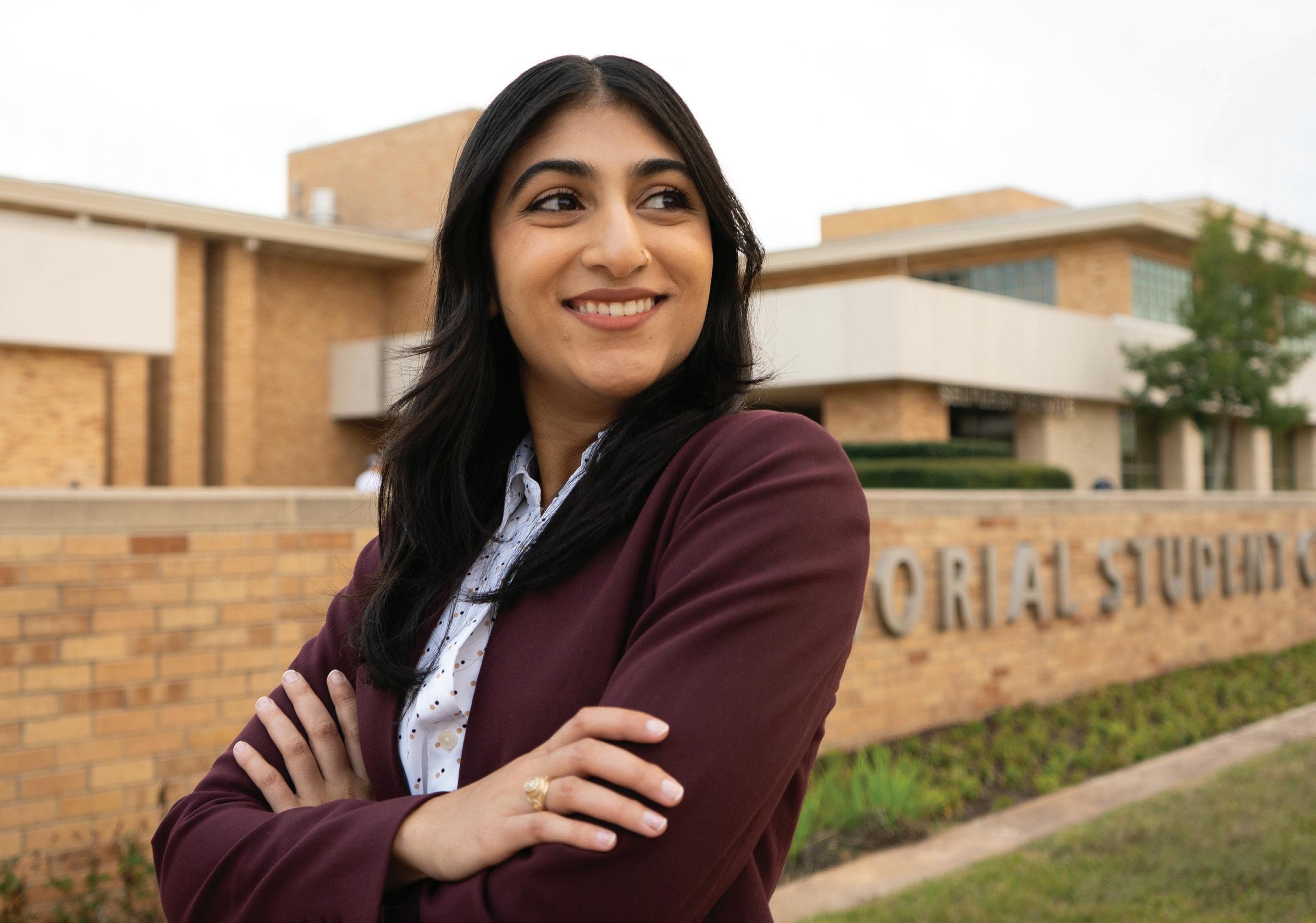
described her first interaction with Raabe as validating. “Without having met me yet, she knew me, my face, and how to pronounce my name,” stated Deshmukh. “I felt right at home.”
In keeping with university-wide priorities, Mays Business School invests in leadership, working to transform tomorrow’s leaders by equipping them for growth, today. Mays staff and faculty engage intentionally. “We are working to create a culture of care at Mays, and in the Business Honors program,” shares Raabe. “We don’t just want our students to feel cared for as incoming freshmen, but valued and equipped throughout their collegiate career and beyond.” For Deshmukh, the deliberateness with which Mays pours into their students has shaped her loyalty to the university – “I recognized Mays Business School was going to value me in a different way than any school anywhere.” Now on the cusp of completing her bachelor’s and master’s degrees in just four years– and with significant experience leading on campus– Raabe says Deshmukh is raising the bar. “Neha exemplifies the traits we desire for all Business Honors students; academic excellence, business competency, and holistic education – getting involved on campus in ways that will impact others, and ultimately shape how they step out into the world.”
Deshmukh’s philosophy for leadership is simple, serve others, listen well, and work harder than everyone else – and she’s lived that out in the myriad ways she’s served on Texas A&M’s campus, giving back to the student body. She began planning her MSC involvement and desire to impact campus life before ever stepping foot on the grounds. The summer before her freshman year,
Deshmukh attended the MSC ConwayFitzhugh International Honors Leadership Seminar in Italy. “It was 30 perfect strangers gaining valuable experience and knowledge,” described Deshmukh. Deryle Richmond, an MSC associate director has worked closely with Deshmukh and was moved by how quickly she got involved. “Her time in Italy was an immersive experience but also gave her the opportunity to learn about leadership and opportunities for involvement on campus,” shared Richmond. “She has maintained involvement in the MSC her entire college career, since before her first day of classes.”
The weeks she spent in Italy were formative and valuable. Deshmukh is a team player and one key takeaway from the seminar was how to lead effectively by knowing when and how to depend on others. Deshmukh shared, “After those two weeks, I not only knew what it felt like to have people in my corner, but what it really meant to be present in someone else’s.”
Deshmukh leads deliberately and effectively. No place is her impact more notable than the MSC. Her path to the presidency has been unconventional – an impressive assent MSC mentors attribute to a marriage of her tireless work ethic, raw leadership chops and the exceptional preparation for organizational management she’s cultivated at Mays.
While moving up the ranks of MSC Aggie Cinema to eventually chair that student committee, she ran the parallel path of serving on the MSC Finance Resource Team. MSC Program Manager, Mary Compton praised Deshmukh’s experience with Mays for its impact on her role with business finance.
“With her business acumen and accounting
“I recognized Mays Business School was going to value me in a different way than any school anywhere.”
background, Neha dove into the budgeting process with a confidence and understanding most students just aren’t equipped to wield.” Compton continues, “as each student committee walked through the annual budgeting process, not only did Neha understand the work at hand, but she was able to walk her fellow student leaders through the complexities of the budgeting framework in ways that made it seem simple.”
Her passion for service grew with every opportunity to collaborate with the student body, giving her the confidence and motivation to run for MSC President. “The experience and relationships I had built within the MSC made me feel qualified to lead them and to lead them well,” Deshmukh shared. For those who work closely with her, the level of preparation and conviction Deshmukh brings to the table is no longer surprising. Richmond summarized, “she tackles projects and problems with a focus few people bring to any topic.” As one of few MSC presidents to make the leap from MSC Aggie Cinema chair to the top office, Deshmukh’s preparedness for the presidential interview process was superlative. “The quality of preparation and background work she performed in advance of her interview was truly impressive – and reflective of the professional development she’s experienced as part of Mays,” noted Richmond. “She knew how to visioncast and translate her experiences into relevant data points, painting a picture of how she could help the MSC reach its potential for student impact.” Now, working collaboratively with cross-functional teams within the MSC community, she’s leveraging her business acumen, institutional knowledge and charismatic leadership to make a difference.
Deshmukh’s chief ambitions and intentions as MSC President are to help students thrive, fulfill their potential, and to create a “home away from home. Overseeing three divisions of the MSC, Programs, Business, and Diversity, Deshmukh is determined to advance each area with the help of her team and the students on campus. “Our students are bright; let’s continue to set things in motion to support them now and in future generations,” said Deshmukh. Raabe believes Deshmukh is just the woman for the job. “Neha leads with confidence and humility, building a team for meaningful impact,” says Raabe. “She is not just vying to build a resume, but fully involved, contributing in ways that can really add value to the organizations and places she cares about.” Compton describes Deshmukh as an “authentic leader, really connecting with those she leads.” Richmond agrees. “Neha is an effective collaborator; she knows when to lean on the expertise of others – striking the balance between delegation and engagement.” Beyond the MSC, Deshmukh is notably engaged in supporting mental health initiatives for students, in partnership with other campus leaders; she advocates for increased student awareness and accessibility of urgent online counseling services through MySSP. Additionally, she sits on the Board of Directors for BUILD, a group that works to build and distribute portable medical clinics.
Deshmukh is also quick to pour back into the program that’s done so much to shape her leadership development at Texas A&M, Mays Business Honors. Raabe is appreciative. “Neha has always been very generous about giving back and being engaged in the program, helping with prospective student events.” She continues “She’s
really an important part of this community – within Mays, within Business Honors and within Texas A&M at large.”
Counseling and Psychological Services (CAPS) is partnering with the My Student Support Program (MySSP) app to provide 24/7, on -demand mental health services to Aggies. By connecting students to licensed mental health professionals and a library of online resources, CAPS hopes My SSP will enable Texas A&M University to become “mental health empowered.”

Texas A&M University’s Memorial Student Center (MSC) is a prominent symbol of the institution’s strong history and tradition. The MSC stands as a tribute to Aggies who gave their lives for our country and currently involves about 1,800 students in various leadership roles and committee positions.

Our students are bright; let’s continue to set things in motion to support them now and in future generations.”
Neha Deshmukh ‘23
Texas A&M Senior and Mays Business Honors Student, Grayson Winchester is far from ordinary. Despite a high school graduating class of just a dozen students, Winchester has always felt at home among the expansive Texas A&M student body he now helps to lead. We talked to Winchester about his servant-minded leadership, the evolution of his aspirations, and the faith that keeps him grounded. His experiences with Mays have been central to his collegiate development and longterm vision – and he’s quick to share the credit for his laudable achievements. As the acting Commander of the Corp of Cadets, the senior from Fort Worth, Texas has been emboldened with ample opportunity to put his leadership aptitude into action.

Winchester’s commitment to excellence is evidenced equally across his academic and extra-curricular endeavors. Set to begin a career in management consulting upon graduation, Winchester is driven to pursue meaningful change through high-level problem solving and experimentation, as well as thought leadership and good-old-fashioned hard work. But at the onset of his collegiate career Winchester’s ambitions looked different. His early goals included law school, but exposure to the consulting track at Mays and the opportunities associated with Business Honors helped to shift his focus. We asked Winchester’s Mays advisors to elaborate.
“Business Honors is a great fit for a student like Grayson with unconventional long-term career aspirations,” shares Claire Raabe Program Manager for Business Honors and Deputy Director of Business Fellows at Mays Business School. A Business Honors major gives students the freedom to build their own program, effectively customizing curriculum and cherry-picking the courses that best suit their interests and aspirations, from management and leadership, to venture capital and consulting. “We offer the flexibility and encouragement for students to gain core competencies across business functions, as well as the freedom to explore and customize their academic experience,” shares Raabe. “Additionally, we put a lot of emphasis on values and self reflection – because freedom and flexibility aren’t as valuable if you don’t know who you are and where you want to make an impact,” she notes, “and Grayson is one of the most reflective students I have worked with.”
Now, with a position at top-tier consulting firm, Deloitte, lined up after graduation, Winchester looks forward to putting the skills he’s honed at Mays into practice.
“Early on I envisioned using a law degree in the nonprofit sector to fight injustice,” shared Winchester.
“Now, I am confident that the skills and relationships I will build by launching my career in the consulting space, will position me
well for long-term, meaningful involvement in the nonprofit sector.”
Prior to his time at Texas A&M Winchester was quick to tackle every leadership opportunity in his reach, even reading up on leadership strategy in advance of his arrival in College Station. It was time well spent, informing his involvement in the Corps of Cadets, Student Government Association, Legislative Relations Commission, and countless other organizations and honors that have shaped his time in Aggieland.
Commandant of the Corp of Cadets, Brigadier General Patrick R. Michaelis has worked closely with Winchester as both mentor and direct supervisor in Winchester’s capacity as Corps Commander. “Grayson’s level of reflection and maturity, is what you could expect of someone with 10-15 years experience in industry,” shares Michaelis, who is quick to credit Mays programs for contributing to the polish and intentionality that underscore Winchester’s leadership style. “Coming out of a program like Mays Business Honors, Grayson understands span of control, organizational and management theory; he’s someone who thinks deeply and strategically.” He paints a picture of Winchester as grounded in organizational leadership – laying out a thoughtful and compelling vision with clear goals; engaging
and listening to those he leads, and thereby developing a “coalition of the willing” with whom he puts vision into action. In keeping with Michaelis description of his work ethic, Winchester frequently reminds himself (and others) that, “you can’t do it all on your own; but in whatever you do, give your best – because you will never have that same opportunity again.”
Winchester’s myriad leadership demands require an exceptional knack for balance and scheduling and he seems to take the rigorous pace of his involvement in stride. “Sure, my schedule is a lot, but I really wouldn’t have it any other way,” he shares. “I work to find balance, but the opportunities to serve my fellow students, and the learning opportunities I’ve been afforded here at Mays, can’t be matched.” He tackles his commitment to striking a balance –between academics, his leadership roles, and relationships– with the exceptionalism he applies to every endeavor.
A person with Winchester’s lofty goals, notable achievements, and demanding schedule often draws on a deeper source of motivation. For Winchester, the undercurrent that keeps him moving –when he seems grounded and at ease on days that hardly leave time for a breath– is faith. Asked about how he manages such a full plate, that’s
his answer. “I remind myself to trust that God has a bigger plan, and to entrust Him with everything that lies ahead; I know I’ll see His imprint on each of the decisions I make, and I can go to him first in prayer.” Winchester believes the key to success for each of us is “to find that grounding principle that will keep you motivated and resilient.” This practice of tapping into a higher calling, and meditation through prayer, has kept him moving forward, and it’s that impenetrable faith to which he contributes much of his success and motivation.
The strength of Winchester’s leadership can be attributed to a marriage of his indefatigable work ethic and ability to inspire others, with his natural penchant for selfless service, a quality his Mays advisors and Corp leadership were quick to notice and encourage. “Grayson’s priority is truly philanthropy and service,” shares Michaelis, “and he uses his considerable platform to reinstill this value of selfless service in support of others.”
When he takes on a position of leadership, such as his role as Commander of the Corps of Cadets, he is driven to shape an atmosphere of mutual respect and support.
Winchester expands, “ I always want to create an environment where authenticity is the baseline for team members who care about each other’s success and growth.” He continues, “practically speaking, that looks like serving those around
you; prioritizing the work of others alongside your own; and, for leaders – not being afraid to get into the weeds.” He notes that effective leadership requires your team to see you exercising the same excellence and discipline you ask of them.
Unsurprisingly, Winchester would one-day love to put his servantleadership skills to use in more direct, service applications. Recently, he spent time serving in Burma, where he was involved with the organization Free Burma Rangers. Founded in 1997 by a Texas A&M former student, Free Burma Rangers is a multi-ethnic humanitarian aid group fighting to provide relief to communities facing poverty and political despotism as the result of prolonged civil war in Burma. The group provides medical aid, food support, and encouragement to vulnerable populations. Winchester was impressed in volunteering with the group that their goal is to deliver not only basic necessities but to come alongside those they serve in love. He was also struck by the way love was central to the cohesiveness of each unit. He shared, “as they spend more time with one another, they become less united from a common enemy perspective and more out of a common love for one another.” He aims to unite those he leads with a similar energy, and his positive outlook has been described as contagious. “With so many people in need globally, I want to be a part of the change.”
Winchestester’s excellence, leadership, vision, and determination to give
back reflect a value set Mays’ students continuously strive for. The transformational leadership style he’s embodied will leave a lasting legacy on a campus reknowned for leaderbuilding. General Michaelis’ most telling observation reflects that legacy, “I’m confident Grayson Winchester will be remembered as one of the greatest Corps Commanders of the last several decades.” For such a storied institution, that’s a high bar.
Brigadier General Patrick R. Michaelis is the acting Commandant of the Texas A&M Corps of Cadets, the largest uniformed student body in the nation, outside of the military academies. As Commander, Grayson Winchester is his top-ranking student leader.
Now, with a position at top-tier consulting firm, Deloitte, lined up after graduation, Winchester looks forward to putting the skills he’s honed at Mays into practice.

“I work to find balance, but the opportunities to serve my fellow students, and the learning opportunities I’ve been afforded here at Mays, can’t be matched.”
For more than ten years, Mays Business School has been coaching and guiding Aggies through the unique world of mergers and acquisitions through the innovative high-caliber class, “Dealmakers in Mergers and Acquisitions.”
The class, the students, the faculty, and the Mergers and Acquisitions (M&A) sponsors work together to showcase Mays Business School to the business world, and how Mays graduates are helping to lead the future of developing transaction professionals.

Dealmakers in M&A is the next step in innovative learning, both at Mays and in the country. Active real-word M&A professionals from leading private equity firms, credit firms and corporations around the nation lead students in team competitions, class lectures and discussions, and case studies on real-world deals. Dealmakers encourage students to be creative and authentic in their thinking and performance, learning to deal with ambiguity and take risks so that they hit the ground running when they land in the post-graduate world. Not only do students get to work on real transactions,
but they are also able to work in a diverse, crossfunctional team of undergraduate, Professional Program in Accounting (PPA) and graduate students to meet their learning goals.
Dealmakers is not just another class or curriculum requirement. Selected students must weather an extensive application process to demonstrate their ambition, ability, and interest in M&A. Each Fall, Dealmakers invites 30-35 high-performing Mays undergraduate and graduate students with a particular interest in investment banking, private equity, corporate M&A, transaction consulting or other M&A and transaction-related professional services to step outside their comfort zone and stretch themselves intellectually and interpersonally. The purposeful inclusion of diverse student backgrounds, work experiences and academic majors drawn from across Mays ensures the uniqueness and real-world perspective of the class while forming the next generation of M&A professionals.
This class and these students are unlike any other business-related class in the country. So, what
makes the class special? Drew Koecher ’88, the class’ founder and Managing Director at Houlihan Lokey, stated that “We teach the students to work with ambiguity, uncertainty and realworld M&A conditions; we translate academics to application through the lens of the nation’s leading M&A practitioners– that’s what we do.” Encouraging the students to think outside of the classroom by placing them in a competitive, high-intensity transaction world where there is market inefficiency and things move at deal speed allows them to reach further and prepares them for what to expect in their future careers.
Dealmakers specialize in authenticity; each group of students brings something new to the table each Fall semester, and each guest M&A professional has a different story to tell and case to share, with a one-ofa-kind hands-on learning experience. William Davenport ’93, the CFO of Topgolf, is a returning speaker to this classroom, bringing the company’s closed cases for students to practice on and think beyond the boundaries of a classroom. After all, the students are what make the class different. As Davenport described, “They all just seem to have high integrity. They all
work hard, and this class requires them to work very quickly. And as a group, they all support and learn from each other.” With an unparalleled studentcaliber class drawn from across Mays, Dealmakers like William continue to set Mays students up for success in the professional world of M&A. Students walk out of this classroom prepared, excited, and eager to start a career in M&A – the vast majority landing in marquee investment banks and M&A advisory firms. Along with Houlihan Lokey as a participating firm and the leading employer of Dealmakers graduates, global investment firms and companies such as Stone Point Capital, The Sterling Group, Fortress, Audax, HollyFrontier, EQT, Partners Group, Dynegy, and many more, are involved in helping students prepare for and navigate the professional M&A world. Mays 2018 graduate, Courtney Nutting, jumped into M&A directly after graduation and is grateful for what Dealmakers taught her. She expressed that, “The Dealmakers class can give you as much as you put into it, and from my experience, it has given me the most out of any other “HighImpact Program” in Mays. Following Dealmakers, I was able to leverage

my experiences from the course in interviews, which ultimately landed me a full-time job at a Private Equity shop in Denver.” Dealmakers put in the work for their students, and they return the favor to make Mays and Texas A&M more proud than ever. Courtney has continued the circle of learning as she is repeat Dealmaker case presenter and champion of Mays students in the private equity community.

Dealmakers is leading the next generation of M&A professionals, setting itself apart from other businessled classes around the country and with it, is driving Mays to the forefront of market-based progressive learning. Sean Murphy ’96, the class’ co-founder and a Managing Director at Houlihan Lokey tells each class at the outset, “This will be the most challenging course you take at Texas A&M, but the personal growth you earn and the realworld experience you gain repays your efforts exponentially.” WATCH

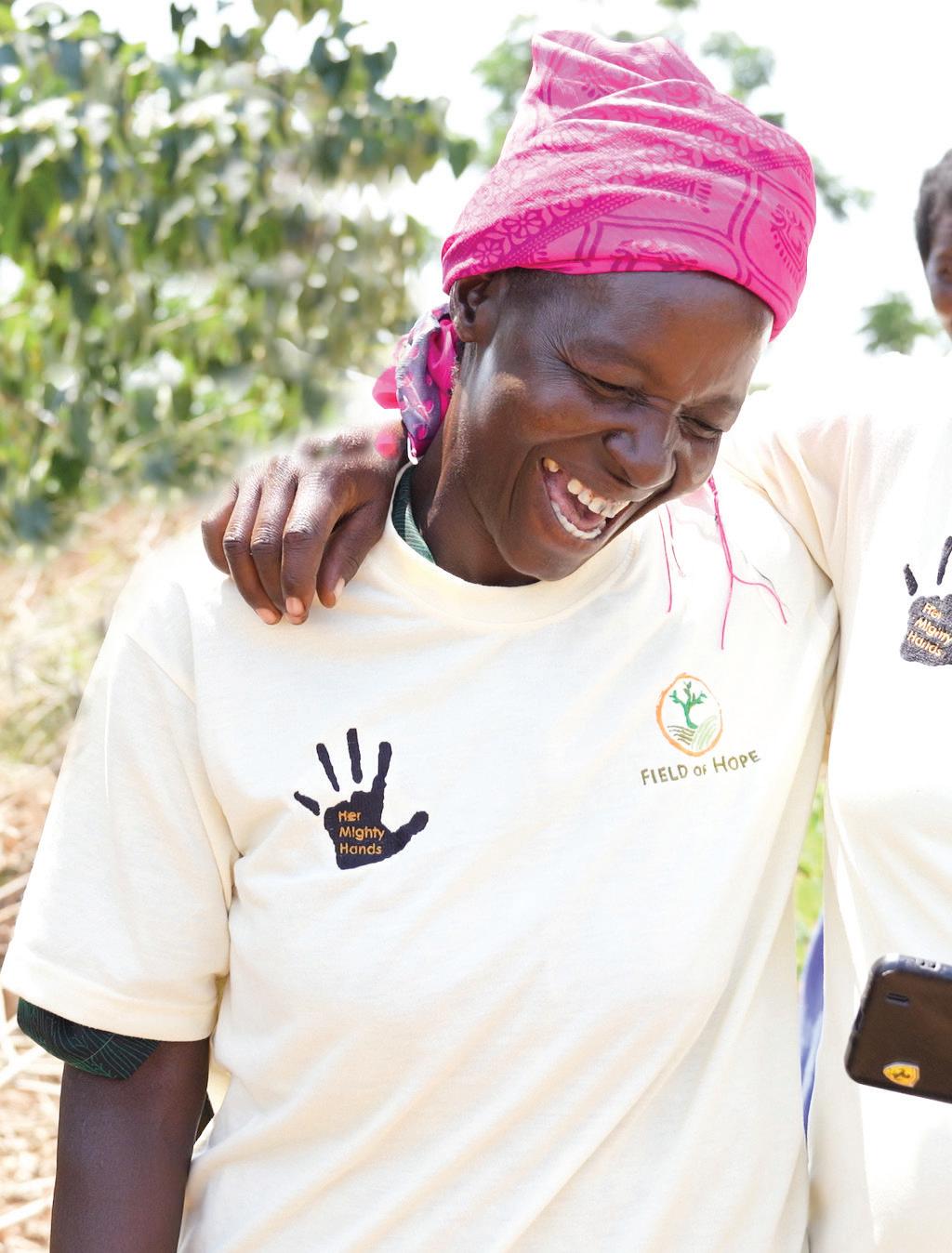
Like every mother, Adero Judith wants a better future for her daughter, who dreams of being a physician. Yet, Judith, who is a female farmer in Uganda, faces significant challenges ranging from drought to food insecurity that can put her future as well as that of her daughter in jeopardy.
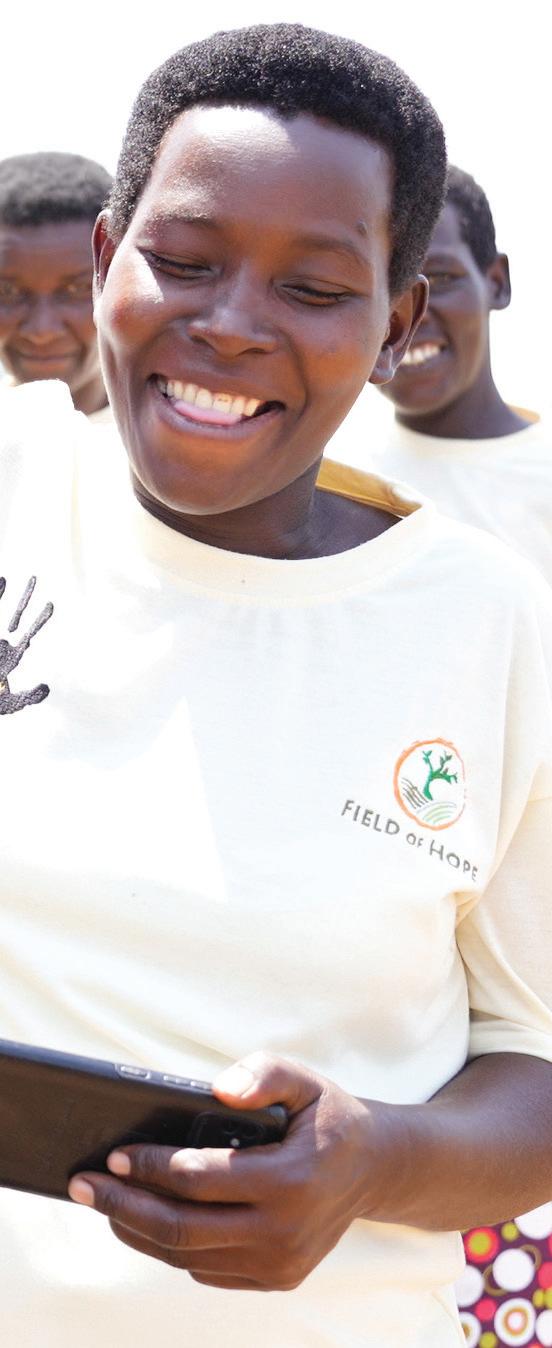
Fortunately, Judith’s ability to grow more and better crops is increasing—as is her income— thanks to Ryan Staples, a graduate of Mays Business School’s
Full-TimeMBA program.
Staples has founded the non-profit Her Mighty Hands, an initiative that uses technology to help these women farmers increase their production.

“The whole idea is to empower women,” Staples said. “We’re not coming in dropping off money or port-a-potties.
We’re dropping off knowledge –and this is the primary gap that these women have. They don’t have access to knowledge.”
Her Mighty Hands’ initial concept was developed by an interdisciplinary Texas A&M team that Staples led in the 2021 Norwegian Business School Global Case Competition. The contest drew 85 teams from 60 top-tier universities, who were challenged to generate game-changing solutions to food production issues involving obesity, malnutrition, and climate change.
The Texas A&M team--which included Danette Philpot ’23, Garrett Brogan ’22 ’25, and Meikah Dado ’22 ’25 from the College of Agriculture
and Life Sciences’ Department of Agriculture Leadership and Communications--earned third place in the competition.
In proposing their solution, the team noted that more than one-third of Ugandans suffer from chronic malnutrition, which is compounded by significant gender inequality issues in the nation’s food production system. Eighty percent of the food consumed by the nation’s populace is produced by women; however, one Ugandan man can produce three times more food than a Ugandan woman. “With 80% of the food producers only one-third as productive as their counterparts, there is a huge area of opportunity,” Staples noted.
The Aggies pointed out that the reason for this imbalance is that female farmers cannot attend in-person agricultural best-practice trainings because they are working in the fields and caring for children and the elderly. The team proposed providing access to extension resources through videos, produced in the local dialect, on handheld electric devices with solar chargers that the women, many of whom are illiterate, could watch
repeatedly to learn best practices in farming.
The team projected that if the initiative was implemented over a 10-year period, 3 million women would be empowered. Furthermore, their analysis found that this innovation could lead to a 30% increase in overall agriculture productivity and a $450 million increase in Uganda’s GDP.
Energized by the team’s success, Staples began to strategize how to make the dream a reality. “I had become so passionate about the idea that at that time, I was committed to pressing forward—but I had no idea at that time what I was getting myself into to start my own non-profit business,” he said.
Despite its promise, the initiative needed more substance to attract funders. To that end, Staples decided to use the Full-Time MBA’s required capstone project to lay the foundation to start a non-profit. “I wasn’t really making a ton of traction until that happened. That helped me get everything off the ground,” he said. “From that point, I was able to identify my business strategy, what needed to happen, and how I could take this idea and make it become a reality.”
As a part of the capstone project, Dr. Janet Marcantonio connected Staples with Chris Fields, who served as a mentor and helped the graduate student focus. Staples credits Fields’ counsel, which was based on his experience running a non-profit in
Ghana, with accelerating the launch of Her Mighty Hands by 5-10 years.
As he began developing the nonprofit, Staples knew that he wanted to reflect the women’s commitment in the organization’s name. “What I am trying to do is to essentially help women lift up themselves, their families and communities from generational poverty,” he said. “I was thinking of the tools that these women use to leverage that. These women have such incredible resilience and grit—and it’s through the labor of their hands in their fields that they’re able to feed their families and empower themselves.”
One of the initial questions that Staples needed to explore was funders’ concerns about whether the Ugandan women would abuse the smartphones or tablets. He connected with a Ugandan NGO, Girl Power Project, which helped him coordinate primary market research with 10 female farmers. The research effort garnered very positive feedback from the women.
He then had the opportunity to pitch the idea of creating a partnership that would give Staples’ access to women farmers to another Ugandan NGO, Field of Hope. With the organization’s commitment in hand and some initial fundraising, Staples launched the pilot project in February 2022.
That initial venture offered some impressive results. The women who had access to the smartphones had, on average, 4.9 months of food security after their harvest season,

which was 88% more than the control group without phones. The women with smart phones also earned seven-times m ore income from post-harvest crop sales than the control group.
A visual comparison between the two group’s fields also showed significant differences in crop growth. “You can visibly see a dramatic increase in the well-being of the crops among women who used these phones,” Staples said. “The data supports that as well.”
The farmers with phones also credited the best practices with increasing their productivity in other ways. For example, Akullo Flo noted that approximately 40% of her previous crops were destroyed by insects, diseases, and drought. Thanks to the technology and videos, she changed her farming methods and now has a much higher crop yield. The extra profits are then used to buy malaria treatments and her children’s school uniforms.
The pilot project also created significant positive ripple effects as two of the women in the pilot group were able to grow enough produce to be able to send their children to school for the first time ever. “Her Mighty Hands gives me hope to not worry so much,” Judith said. “I now know when to plant my crops timely to get a better harvest, which helps send my children to school.”

Over the past year, Staples has been consistently impressed with the women’s commitment to learning. “They’re part of a group of women who have shown that they want to improve their status in life,” Staples said. “It’s the difference between keeping your children at home to do the farmwork with you or sending your daughters to school—or keeping your daughter from getting married off as a child bride because you can afford to feed her for a couple of extra years so she can become an adult. This is the different changes in the women’s lives—and they’re trustworthy because they are part of the system.”
Staples has legally established Her Mighty Hands as a non-profit. The organization’s board includes several familiar faces--Alexa Wilcox, who previously served as Field of Hope’s executive director, as well as Dado, who is now a Texas A&M Ph.D. student and is coordinating the group’s data analysis.

With a second fundraiser completed, Staples is focused on setting up the non-profit’s website and increasing marketing efforts. In 2023, he also wants to raise $50,000 to provide Her Mighty Hands smartphones with training videos to more women in Field of Hope’s cohorts. The partnership with Her Mighty Hands and Field of Hope wants to produce new videos in English and the local dialect during the spring growing season and to launch a second pilot project in the fall.
He also foresees the program continuing to grow. “The idea is for these women who are part of this pilot to become community leaders and spread it out to their communities,” Staples said. “This solution is so scalable that we could bring this to any country in the world as long as we have a way to build up these communities.”
At the end of the pilot, every woman said two things: “The first was thank you so much for this idea and allowing us to participate—and thank you to the donors,” Staples said. “And the second, without fail, was we want this solution for all of our sisters in the cohorts.”

Ultimately, Staples credits the formation of Her Mighty Hands to his time spent as a Full-Time MBA student at Texas A&M. “It’s through the goodness of others, the connections from Mays Business School and Texas A&M at large as to why this was successful,” he said. “Apart from the connections, which accelerated the launch by 5-10 years at the least, I also developed the skillset and the mindset. We learn in the MBA program how to run a business and the type of questions to ask and the types of things to consider. I did not have that skillset prior to my time at Mays Business School.”
Additionally, Staples appreciates the confidence that he acquired at Mays, which has helped him launch Her Mighty Hands. “Before entering business school, I didn’t believe in myself as much as I do now and what I was able to contribute to the world and others,” he explained. “Mays Business School’s mission to improve the world’s prosperity was foundational in helping me know that I wanted to give back to others. I now have that skillset and I realize that I’m not an imposter; I can do something that big and outside of myself.”
by Her Mighty Hands

“You can visibly see a dramatic increase in the well-being of the crops among women who used these phones.”Photos
An innovative new program in Mays Business School preps students for careers in the tech industry. Remember when banking involved visiting a branch location, ridesharing meant hailing a taxi, and entertainment companies made movies, not content platforms? Today, the customer experience has increasingly shifted to the digital space, and as the world becomes more convenient for consumers, industry leaders face new challenges and opportunities. Thanks to a new program at Mays Business School, Aggies will soon be ready to meet them.
To be officially launched in fall 2023, Aggies in Tech provides a specialized curriculum for students who have their sights set on leadership positions with firms like Amazon, Apple and Google. “The vision is to create opportunities for our students to obtain highly paid jobs with influential tech firms, primarily on the West Coast, and to replicate the success we’ve had in New York with Aggies on Wall Street,” explained Sorin Sorescu, Director of the Adam C. Sinn ’00 Center for Investment Management.
Along with coursework created with input from industry leaders, Aggies in Tech
students will gain experience in the industry through networking events, internships and Tech Treks—trips to Seattle and Silicon Valley to meet with Aggies in the tech field as well as leaders of targeted firms for potential internships and careers. Importantly, the Aggies in Tech program will be open to students from across the university.
“Aggies are currently underrepresented in the tech industry,” said David Alexander ’98, chief marketing officer at Everbridge, a critical event management company based in Burlington, Mass. Alexander has spent his career in tech previously with Microsoft, SAP, and F5 and is using his insights to teach a course for the Aggies in Tech program. “We’ll develop core competencies that will differentiate Aggies from others by focusing on practical skills, not just theory,” he said, noting that it’s not about training students just to code but rather teaching the bigger picture of how to make a tech company successful.
A key deliverable of Aggies in Tech is an app each student will create from initial concept to final execution. The purpose is to demonstrate technical skills and a vision for improving consumers’ lives with technology.

“When these students interview for jobs, they’ll have an exciting story to tell that sets them apart,” predicted Sorescu.
Many Aggies have the skills and passion needed to break into the tech space, but Texas A&M has not been a target school for most of these companies. Similarly, top tech firms have not historically recruited heavily in Texas. “There’s no shortage of talented, intelligent students at Texas A&M,” explained Preston Bloskas ’15, an executive at Checkout.com. All that’s missing is the pipeline to opportunities in this field. “As Texas A&M students get recruited to these places, their value will become apparent, and they will multiply.”
Aggie Venture Fund and Aggies in Tech supporter Evan Loomis ’03, founder of ICON Build, and his wife, Brandi ’05, are thinking bigger. “If we just want to get Aggies jobs at Google, SpaceX and LinkedIn, that’s actually
To be officially launched in fall 2023, Aggies in Tech provides a specialized curriculum for students who have their sights set on leadership positions with firms like Amazon, Apple and Google.
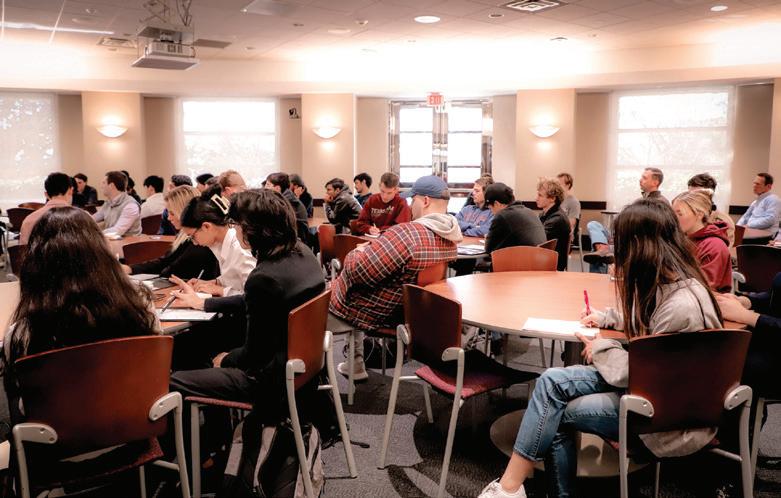
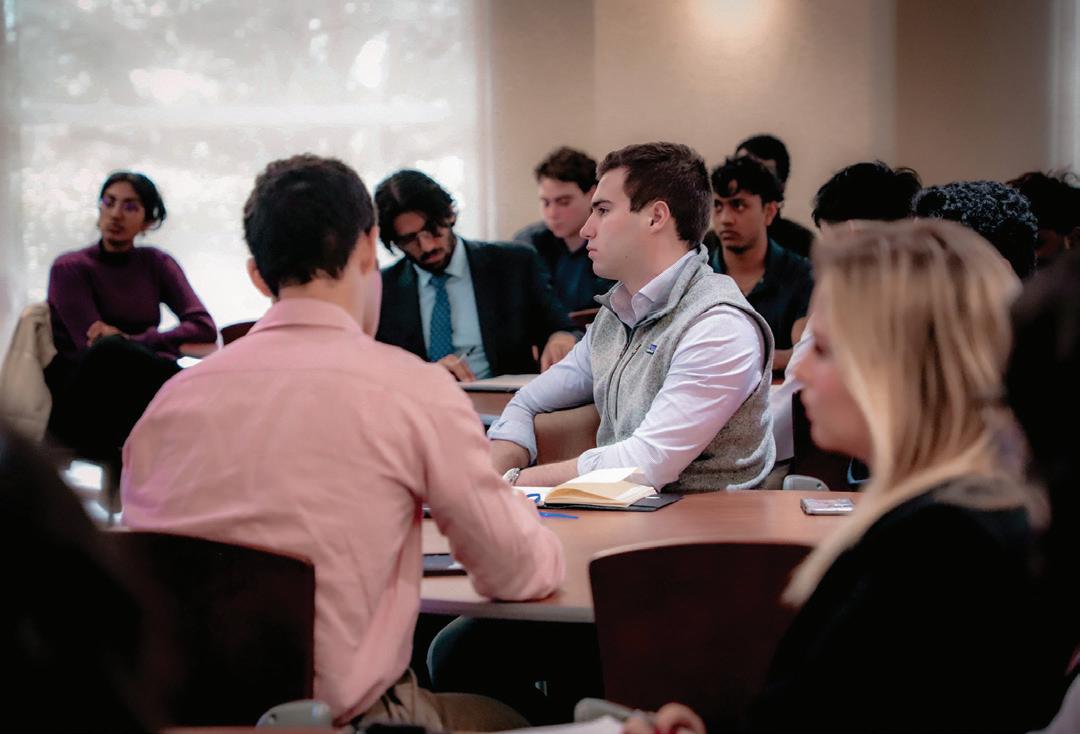
Aggies in Tech program students recently attended a gaming panel that included representatives from EA and Activision
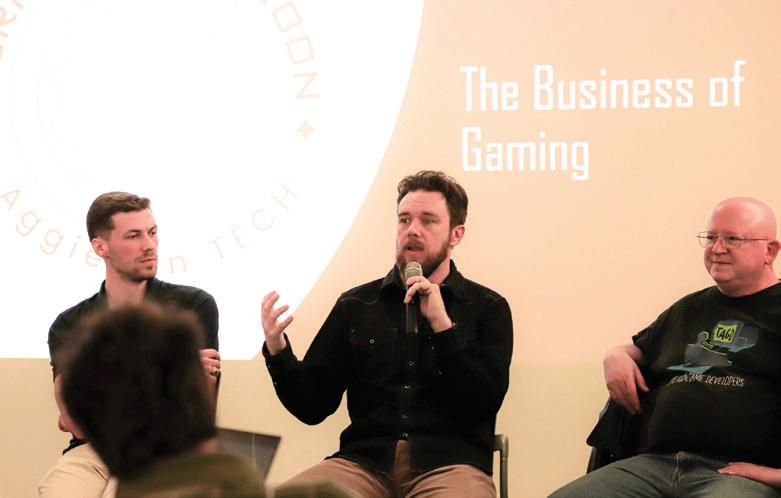
a very easy proposition, but it’s not what I’m most interested in,” he said. Instead, Loomis envisions Aggies creating the future of business with technology. “I want the values of Texas A&M to shape the future world that we live in.
Aggies can be leaders in entrepreneurship and innovation. This is just the first strike of the match that will set something bigger ablaze.”
The Aggies in Tech program needs endowed excellence funds to support travel, events, speakers and staff. Additionally, the program seeks Aggies in the tech industry willing to lend their expertise.
To learn more, contact: Mark Toler ’19 Assistant Director of Development Texas A&M Foundation 800.392.3310 or 979.862.4531 mtoler@txamfoundation.com
Texas A&M University’s Mays Business School held a ceremony to break ground on the new Wayne Roberts ’85 Building, October 28, 2022. The ceremony included a short program emceed by Texas A&M Foundation President Tyson Voelkel ’96 that featured speeches by Texas A&M University President M. Katherine Banks, recently retired Abrigo President and CEO Wayne Roberts ’85, Texas A&M Student Body President Case Harris ’23 and Mays former Interim Dean Ricky Griffin.
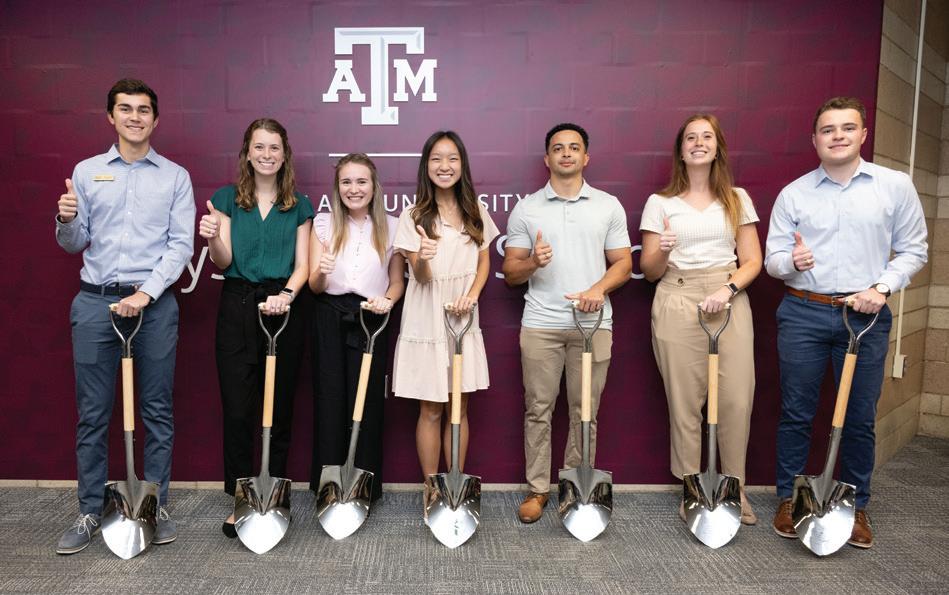



The vision for the expansion to the Mays Business Education Complex (BEC) is an environment that promotes connectivity, creativity, and collaboration. It will be a reflection of how business will be conducted in the future. Fronting on Olson Boulevard, the new 82,500 gross square foot, Wayne Roberts ’85 Building will be a gateway to the Mays Business
Education Complex and include spaces for academic innovation through active learning with enhanced engagement of students, faculty, staff, and visitors. Amenities include a grand atrium for assembly and college-wide functions, flexible huddle spaces, and a café for creating “collisions” between a wide array of Mays’ stakeholders.



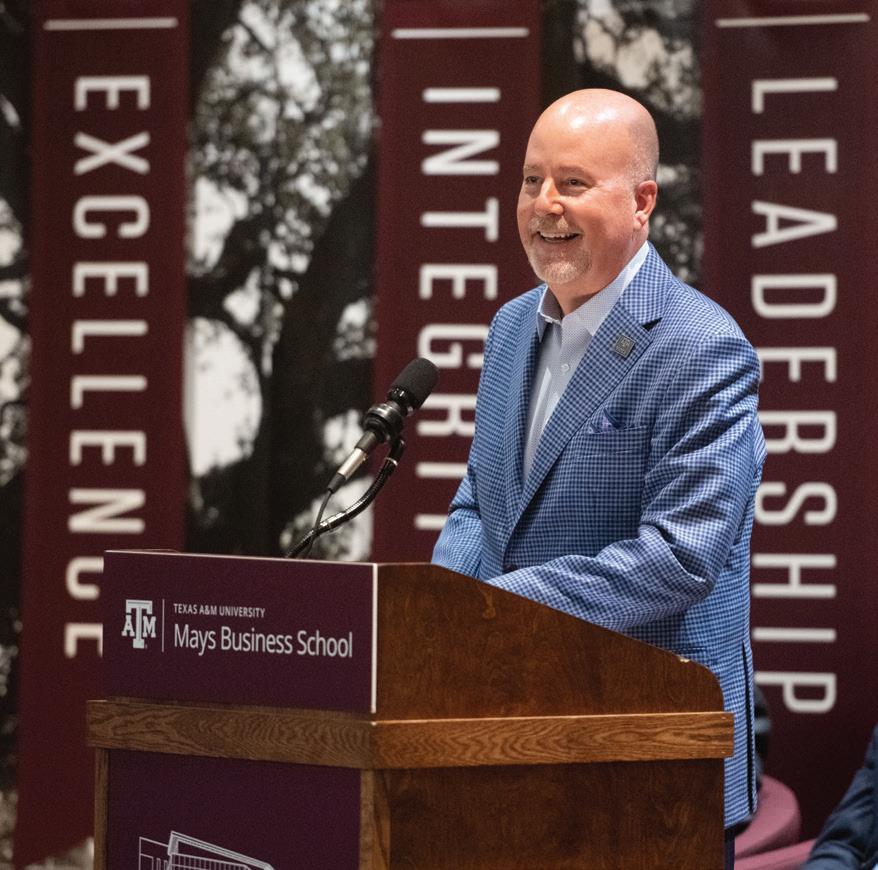
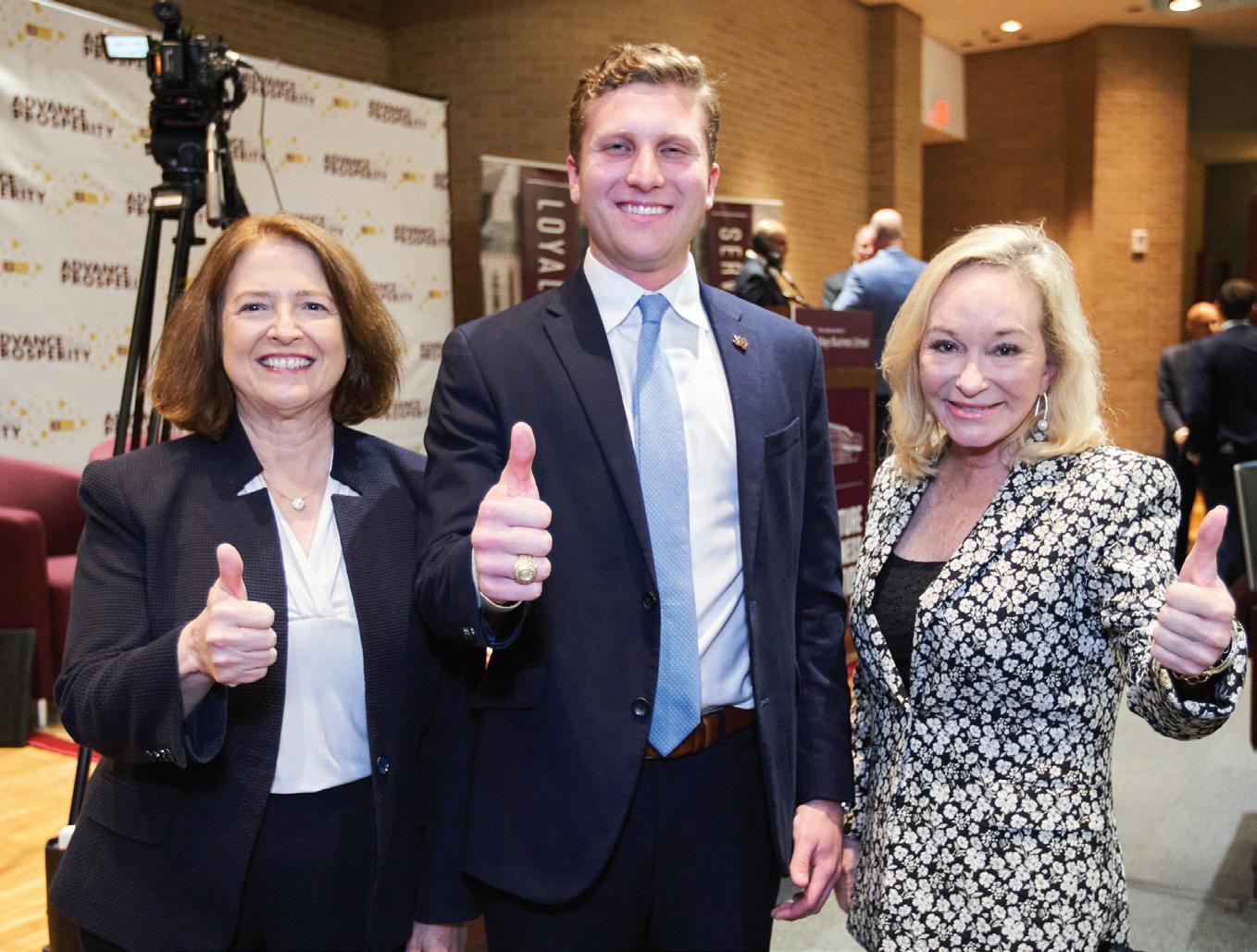




The Marketing Strategy Course is the capstone course where students find the opportunity to practice all the marketing concepts they learned throughout their university education career. This class provides a real-life experience to the students in a safe classroom environment. The client organization brings a real-life marketing problem to the classroom and asks the students to help them find a solution. The students analyze the problem by doing marketing research and compete in teams to find the best solution by using their marketing knowledge. The outcome of the project is a presentation or a report that guides the client depending on the nature of the course.

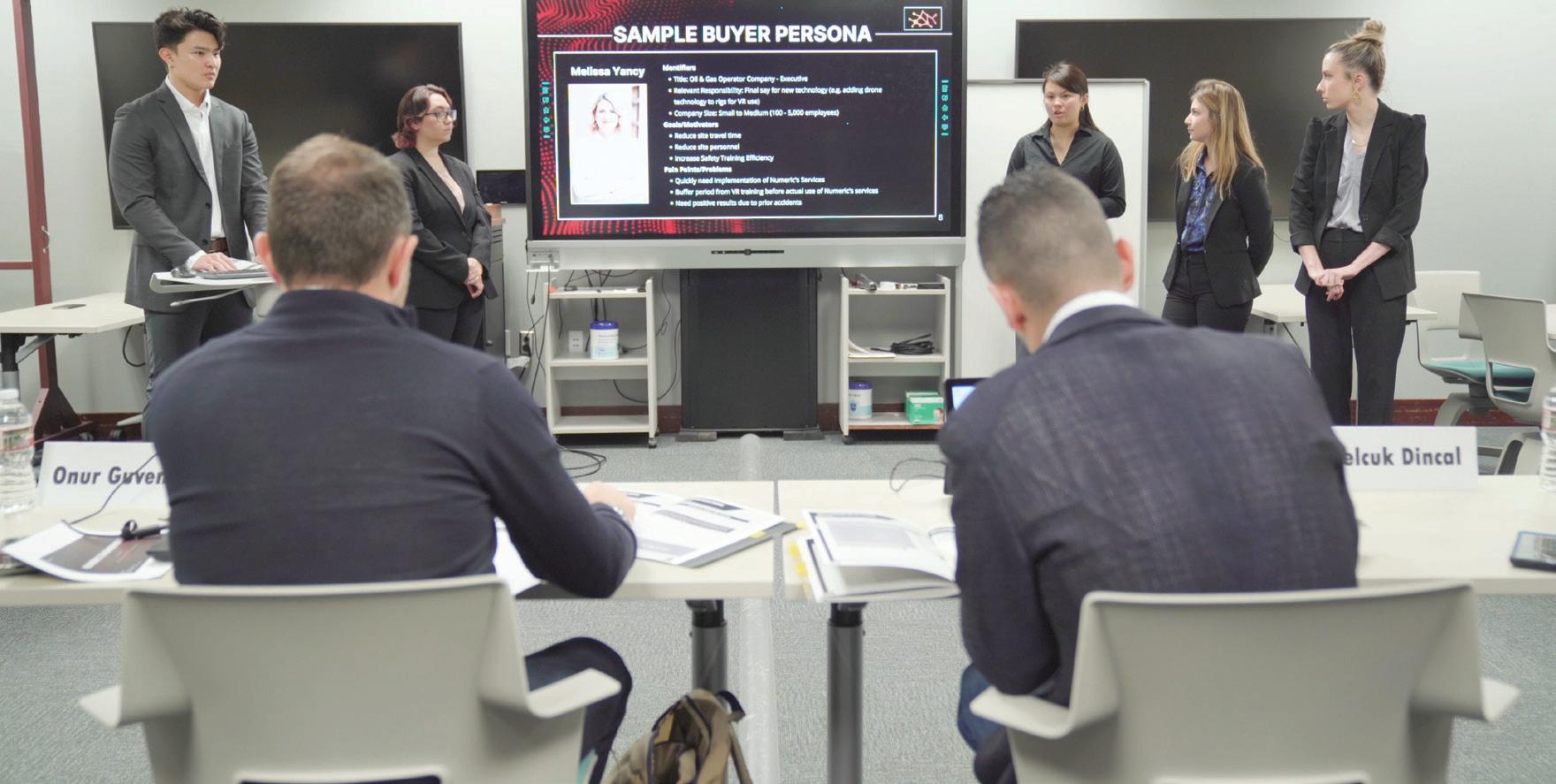
Executives L.T. Therivel ’96 and Larry O’donnell offer insights from ‘Undercover Boss’ and their careers.
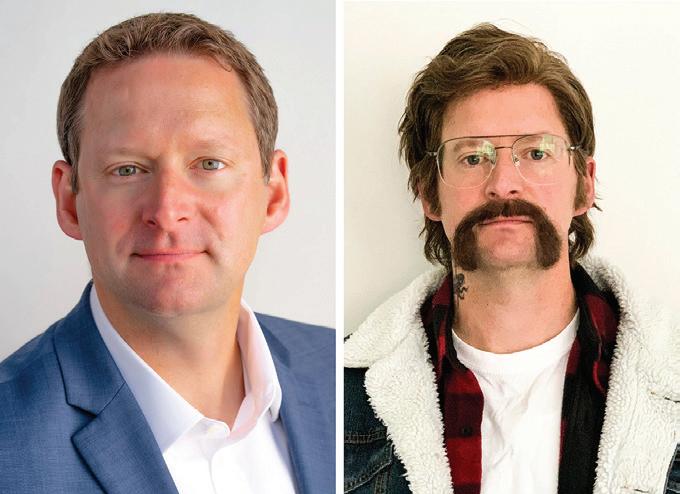
Mays Business School students had the opportunity to learn from two corporate leaders who were featured on Undercover Boss, the popular CBS television series. The session included Larry O’Donnell, the former president and chief operating officer of Waste Management Inc., and Laurent C. (L.T.) Therivel ’96, who is president and CEO of UScellular.
Their advice, which covered both the professional and personal side of being a corporate leader, was well received by students who will soon be embarking on their careers. One area that particularly resonated was maintaining work-life balance. “I enjoyed hearing L.T. talk about finding your job, figuring out what it requires, and then determining whether you’re willing to put that in,” said Erin Autrey ’25, an accounting major from Pittsburg, TX. “Then figure out your life goal and make sure that those two things—the job and your life goal—align.”
O’Donnell was the first corporate leader featured on Undercover Boss. That show debuted after the 2010 Super Bowl and was watched by a record 38.6 million viewers.
The Houston resident, who took over the company when it was struggling, opened his presentation talking about leadership. O’Donnell advocated for flipping the traditional top-down leadership model where employees serve the leader. Instead, he has had success embracing the servant leadership model where the leader is at the bottom of the pyramid and serves everyone on the team. “The leader is pouring into everyone, helping them become the best they can be,” he explained. “Whatever they are trying to achieve in their career, the leader is trying to help them get there. Then what happens is a bond of trust is created and the whole team wins together.”
O’Donnell also offered some important early career advice. Foremost, he said, was focusing on the job at-hand and doing the best job possible. “Build a team and serve everybody on the team, including
your boss and your colleagues,” he said. “If you’re that type of team player, you will be noticed, and you’ll advance in your career.”
He also encouraged the Aggies to be willing to address their knowledge and skill gaps so they can progress in a career. Noting that this is often uncomfortable, O’Donnell noted, “People often don’t want to face their deficiencies—but everybody’s got deficiencies.”
On a similar note, O’Donnell recommended finding a mentor— and then be coachable. “There are so many people who come to me who want help,” he said. “You start to coach them, and you can tell that they really don’t want to hear it; O’Donnell also talked about his own career path, which took some unexpected turns, as well as how his daughter’s life was tragically impacted by a medical mistake right after she was born, which brought about a tremendous change in O’Donnell as well.
O’Donnell said that event really tested his faith. “When my daughter’s tragedy first happened, I was pretty angry with God,” he said. “I told God it didn’t seem fair, but I later came to realize that it wasn’t about me and my plan, and that God had a different plan for my daughter than I had.”
His daughter’s medical shipwreck ultimately served as a mirror for O’Donnell. “I had no empathy at all before that happened. I then realized that I was a total mess; I was that top-down self-absorbed leadership guy,” he said, adding that he later
decided to attend seminary, create a non-profit organization called Servant Ministries Foundation, and write a book, “Waste Management: Five Steps to Clean Up the Mess” to help others learn from my mistakes from my 40-plus-year business career. “My daughter’s tragedy taught me empathy, and when faced with difficulties to ask ‘what’ can I learn from this situation, rather than ‘why’ is this happening to me.”
O’Donnell added, “My special needs daughter is my inspiration. She is the happiest person you’d ever want to meet, and never complains about her pain.”
Therivel joined UScellular in 2020 as chief executive officer for the fourth largest cellular company in the United States. UScellular focuses on providing cell service in underserved areas, many of which are rural. He was on the most recent season of Undercover Boss.
While noting that Undercover Boss provides opportunities to identify tactical and operational opportunities, Therivel said the show was just as important in validating the company’s culture and organizational buy-in. He pointed to his own experience working as COO with a small start-up that lacked clarity on objectives and goals. “I had been there two weeks and after doing my assessment, blew the place up,” he said. “New strategy, clear goals, clear KPIs, fired
the three salespeople who had sold nothing, changed the org chart, hired some people, made a bunch of changes—and then off we went.”
After 30 months, the company hit its targets—but the CEO and chairman fired Therivel. “Everybody hated me,” he said. “It was my plan, my strategy, my KPIs, my org chart. Me, me, me…there was no ‘we’. When I go back and think about the decisions I made, they were the right decisions—but I spent zero time on culture and buy-in to get people to believe in what we were doing.”
That turn of the events helped inform his leadership style. “It was a huge wake-up call for me. I was really lucky because I learned that lesson in my early 30s, so I had the chance to recover,” Therivel explained. “A lot of people don’t learn that lesson at all or maybe they learn it in their 50s.”
He now believes in the importance of the “how.” “Just having the right answer isn’t enough. If you’re in this room and going to this university, you are whip smart. You will get the right answer,” Therivel advised the students. “Spend as much time thinking about the ‘how’ because it’s going to be just as important as knowing the right answer. How to get people on board? Are they motivated by this? How do I get buy-in? How do I get consensus? How do I drive collaboration?”
Therivel also stressed understanding what the work requires and be willing to do it. At the same time, he recommended aligning professional
and personal goals. He pointed to his time at AT&T where advancement required moving geographically to accept new assignments. At that time, he and his wife had two young daughters and they decided they would be willing to relocate until the children entered high school. “We decided we were willing to make moves for the professional good—and boy, did we. My daughters are 15 and this is house nine, school seven,” he said. “I was able to make those moves and put in the work because I had confidence that I wasn’t sacrificing my family.”
He noted that many executives focus solely on their career without considering their personal lives. He cautioned, “If you’re not careful and you don’t spend the time investing on the personal side and making sure it’s aligned, at some point you reach a level where it’s really hard to recapture.”
Both business leaders addressed unintended consequences that arose from their decisions. For example, O’Donnell described how he had started a program designed to coach workers on garbage trucks and to fix issues that were causing employees frustrations. However, the
employee who O’Donnell worked with on Undercover Boss described them as “spies” sent by the corporate office. “Obviously at that location, it hadn’t been communicated very well,” he told the students. “So, we totally revamped the communication aspect of it so that the drivers would realize that the organization was trying to help them achieve and get home sooner.”
In Therivel’s episode of Undercover Boss, he had to cold call customers—which was an effort he had championed—but the sales associates were unhappy about doing this because most calls went to voicemail. Their discontent was reflected in the show “The concept behind it is there is a fair amount of dead time in stores where you don’t have anybody in the store. You still have to staff the store and you can’t staff it with one person,” he explained. “A lot of times we have people who don’t have a lot to do. That was one idea of how we could better use people’s time.”
He also noted that in this case, the show didn’t tell the whole tale because a customer came into the store in response to the voicemail’s promotion of a specific plan.

Ultimately, both leaders felt it is important to listen to their employees and then respond. “I’m in the field all the time— and I’m not preaching and I’m not telling people, ‘Here’s our strategy.’ All I do is that I walk into stores and say one thing: ‘If you were king or queen of the world, what is one thing that you’d change?’” Therivel said. “Ideally, every action that you take as a leader is tied back to feedback that you received. That way, you’re creating this environment where people will try to give you feedback— but you also have to be cognizant that you’re never going to get it all.”
Student Body President, Case Harris ’23, sat down with Laurent “LT” Therivel ’96, CEO of UScellular, to talk about his personal story, how he defines leadership, his time on campus and much more.







Mays Business School
4113 TAMU College Station, TX 77843-4113

